- An Introduction To German Literature...

An Introduction to German Literature In 10 Writers

As is the case in the realms of fine art and film, Germany’s literary legacy is an expansive one. From philosophy to fiction to verse poetry, Germans have made prolific contributions to humanity through their writing, something that has resulted in international recognition and, perhaps more importantly, a better understanding of the human condition.
Bertolt brecht (1898-1956).
Bertolt Brecht is one of the most influential German poets and playwrights of the 20th century. He and his wife, the actress Helene Weigel, operated the Berliner Ensemble through which they presented Germany with their original theatrical productions. Brecht spent the final years of his life residing in East Berlin. Marxist thought permeated the themes and aesthetics of his works, and he even received the Stalin Peace Prize in 1954. His most influential works include The Threepenny Opera , Life of Galileo , Mother Courage and Her Children , and The Good Person of Szechwan . Today it is possible to visit Brecht’s former home in Berlin , which his wife converted into a museum upon his death in 1956.

Walter Benjamin (1892-1940)
Walter Benjamin was a German-Jewish social critic, writer, and philosopher. He is known as an ‘eclectic thinker’ who blended Marxist theory with other schools of thought, like Jewish mysticism and German romanticism. After studying philosophy at Humboldt University , Benjamin translated the works of Baudelaire into German and became an associated member of the Frankfurt School. He was friends with Bertolt Brecht, Hannah Arendt, Hermann Hesse, and acquainted with many other important thinkers of the time, like Theodor Adorno. Benjamin’s novel, Das Passagen-Werk (in English, ‘The Arcades Project’), is considered his magnum opus and was started in 1927 but never completed, only posthumously was it edited and published. With the onset of Nazi rule in the 1930s, Benjamin fled for his life and ultimately committed suicide in 1940 to escape being accosted by the Gestapo.

Hans Fallada (1893-1947)
Hans Fallada was a German writer who worked during the first half of the 20th century. He contributed to the literary style of new objectivity. Two of his most notable novels are Little Man, What Now? (1932) and Every Man Dies Alone , published in the year of his death. Fallada spent much of his early life working odd jobs, battling addiction, and even committing petty crimes to finance it. He proceeded to work as a journalist and eventually became the subject of Nazi scrutiny. By the time the war had ended, Fallada had also achieved fame and notoriety. Still, the state of society following the war – particularly the ubiquitous presence of fascism that still remained interwoven in the very fabric of the culture – drove him back into a state of depression followed by addiction, which ultimately led to his death in 1947.

Jenny Erpenbeck (1967)
Jenny Erpenbeck is a contemporary German writer and film director. Born in East Berlin, she is the granddaughter of the writer Hedda Zinner. In her young adulthood she studied the art of bookbinding, and then took charge of overseeing props and wardrobe production at theaters throughout Germany. After the Berlin Wall fell, she studied to become a musical theater director at Hanns Eisler Music Conservatory. Erpenbeck directed productions at several operas and even debuted an original play, Cats Have Seven Lives . From here, she has fostered a career in writing both plays and prose works. She is a columnist for the magazine Frankfurter Allgemeine Zeitung , and her most notable writings include Trinkets , Things That Disappear , and The End of Days .

Johann Wolfgang von Goethe (1749-1832)
Often regarded as Germany’s Shakespeare, no discussion of German literature would be complete without mentioning Goethe. Prone to illness as a youth, he initially pursued study in law. Yet, today he is mostly known for his versatile array of poetic works, which include both epic and lyric forms, among others. By the mere age of 25, he already achieved fame as a writer after the release of his novel The Sorrows of Young Werther . One of his most renowned works is his drama Faust . Goethe’s legacy extends beyond his poetry, however. He also served as a statesman, critic, novelist, and natural philosopher.

Christa Wolf (1929-2011)
Christa Wolf is largely regarded as East Germany’s literary darling. Yet, in retrospect, there is actually much to say about her complicated relationship with socialism and politics more broadly. Behind the wall, she wrote within the genre of socialist realism. Over the course of her development as a writer, however, novels like The Quest for Christa T. began to examine the relationship between the individual and socialist ideals, which was not as well received. Wolf remained in the literary limelight following the fall of the wall, but subsequently received a good deal of criticism in the West for her portrayal of life behind the wall and lack of denunciation for the authoritarian rule of the GDR. Yet, many of her fans would argue that she played a fundamental role in articulating a literary voice that was distinct to East Germany.

Become a Culture Tripper!
Sign up to our newsletter to save up to $1,656 on our unique trips..
See privacy policy .

Hermann Hesse (1877-1962)
Hermann Hesse is a German writer, best known for his books Siddhartha , The Glass Bead Game , and Steppenwolf . Hesse was the son of two missionaries who worked for several years in India. He was born in the Black Forest, but spent much of his youth living in Switzerland. These multicultural experiences impacted him as a person and as a writer. Consequently, much of his work grapples with his own relationship with German nationalism. Hesse also cites Indian and Chinese philosophies as his major influences, something that was unique for the context within which he was writing. He was awarded the Nobel Prize for Literature in 1946.

Thomas Mann (1875-1955)
Thomas Mann is a German writer and social critic who worked primarily in the first half of the 20th century. Mann provided fascinating commentary on the psyches of artists and intellectuals through his writing, which often employed heavy doses of irony and symbolism. He was a member of the Exilliteratur movement, which was comprised of German writers who outwardly opposed the Nazi regime. During the reign of the Third Reich, Mann fled to Switzerland. His brother Heinrich Mann is also a famed radical writer, and three of his six children rose to literary prominence as well.

Günter Grass (1927-2015)
Günter Grass was a German writer and illustrator who received the Nobel Prize in Literature in 1999. Born in 1927, a central theme in Grass’ writing was the question of what it meant to be German after Nazism took hold of the country. He is recognized for his contributions to the genre of European magical realism, which was mostly evident in his 1959 novel, The Tin Drum . His other major works included the Danzig Trilogy , The Flounder , My Century , Crabwalk , and his memoirs. The combination of his political messages and his whimsical style of writing often divided people when it came to the critical reception of his work.

Anna Seghers (1900-1983)
Anna Seghers is best known for the ways she articulated the moral conundrum of German people in their complacency during World War II. Seghers herself was Jewish and a communist. Shortly after she joined this party she published her novel, D ie Gefährten, which aptly warned against the perils of fascism. During World War II, she published her acclaimed novel The Seventh Cross . It offered one of the only published descriptions of life in concentration camps at the time. As the war bore onward, Seghers eventually fled to Mexico where she published her most notorious novel, Outing of the Dead Girls, and continued to work in anti-fascist activism, ultimately founding the Heinrich-Heine-Klub.

Culture Trips launched in 2011 with a simple yet passionate mission: to inspire people to go beyond their boundaries and experience what makes a place, its people and its culture special and meaningful. We are proud that, for more than a decade, millions like you have trusted our award-winning recommendations by people who deeply understand what makes places and communities so special.
Our immersive trips , led by Local Insiders, are once-in-a-lifetime experiences and an invitation to travel the world with like-minded explorers. Our Travel Experts are on hand to help you make perfect memories. All our Trips are suitable for both solo travelers, couples and friends who want to explore the world together.
All our travel guides are curated by the Culture Trip team working in tandem with local experts. From unique experiences to essential tips on how to make the most of your future travels, we’ve got you covered.

Places to Stay
The best hotels in germany for every traveller.

Architecture
Breathtakingly beautiful buildings in germany.

The Best Hotels to Book in Garmisch for Every Traveller

The Best Spa Hotels in Baden-Baden

Guides & Tips
The story behind germany's neuschwanstein castle.

Top Tips for Travelling in Germany

The Best Hotels to Book in Thuringia, Germany

See & Do
10 reasons why you should visit bavaria.

Places in Germany for History Lovers

Stay Curious: Experience Germany From Your Living Room

Craft and Culture in the Lesser-Known Gems of Eastern Germany

A Voyage Through Germany: the Lowdown on River Cruising
Culture trip spring sale, save up to $1,656 on our unique small-group trips limited spots..

- Post ID: 883895
- Sponsored? No
- View Payload
Privacy settings
Here you will find an overview of the types of cookies used on the website. You can set your consent for each category individually. Further information can be found in the privacy policy .
- Essential Cookies For the use of the website with all functions (e.g. user settings, watch lists, etc.)
- Statistics Statistics Cookies collect information anonymously. This information helps us to understand how our visitors use our website.
- Marketing In order to provide you with the best possible offer in cooperation with our partners, we use marketing tools. For example, in order to use our chatbot, you must activate this setting.
- External contents Required for viewing external media and third-party content. The provider may set cookies for its part. The respective data protection regulations of the provider apply.
- Inspiring Germany
Cities & Culture
- Nature & Outdoor Activities
- Royal Palaces & Castles
- Experience & Enjoy
- Current highlights
- Sustainable travel
- Barrier-free travel
- Easy language
- Federal states
In the footsteps of German poets
Germany is characterised by its poets and thinkers. Those who want to follow in the footsteps of Goethe, Thomas Mann, and other famous figures can embark on a literary journey.
How it all began
A goldsmith from Mainz invented something groundbreaking in the 15th century: Johannes Gutenberg discovered modern letterpress printing and paved the way for the worldwide distribution of books on a large scale. Even independently of this, Germany was simultaneously developing as a stronghold of literature thanks to world-renowned poets and thinkers. Alongside the great names of Johann Wolfgang von Goethe, Friedrich Schiller, and Thomas Mann, the Brothers Grimm wrote themselves into the hearts of their readers in the first half of the 19th century with their fairytales. A contemporary of the Brothers Grimm, Heinrich Heine, also attracted a great deal of attention with his satirical verse epic "Germany. A Winter's Tale". In it, he criticises the political rigidity of Germany in the first half of the 19th century, the time of the Restoration. Ten German authors have been awarded a Nobel Prize for Literature since the conception of the awards in 1901. Among them are famous names such as Thomas Mann, Hermann Hesse, Nelly Sachs, Heinrich Böll, Günter Grass and Herta Müller.
Goethe once drank here
Weimar/thuringia, leipzig/saxony.
Johann Wolfgang von Goethe, one of the most important and influential poets in the history of German literature, produced epoch-making works such as the drama "Faust", the play "Iphigenia on Tauris", countless poems and ballads and the novella "The Sorrows of Young Werther", a story about unrequited love. His life and work are inextricably linked with the Thuringen city of Weimar , which with its museums, castles and poets' residences brings together European cultural history in a very confined space and is a UNESCO World Heritage Site. When he was 27 years old, Goethe was appointed to the court in Weimar. There, he directed the court theatre for 25 years and was even elevated to the peerage in 1782. The Goethe National Museum with Goethe's residence in Weimar offers fascinating insights into Goethe's life and work. In Leipzig , Saxony, it is also possible to walk in Goethe's footsteps. The poet studied law here from 1765 to 1768. During this time, he frequented a local student pub, where he later famously wrote "Faust".
Hanseatic Lübeck: Old town and Trave river at sunset ©Lookphotos (H & D Zielske) Poet of the North
Lübeck/Schleswig-Holstein
The German author Thomas Mann's most well-known work, "Buddenbrooks" won him the Nobel Prize for Literature in 1929, and confirmed his place as one of the most important storytellers of the 20th century. In this social novel, Thomas Mann describes the decline of a wealthy merchant family who feel they belong to the Hanseatic upper middle class. Mann's own family history and his home town of Lübeck provided the setting and blueprint for the novel. Today, it is still possible to sense the atmosphere that inspired Mann with the imposing brick architecture of this charming north German city. If you want to follow in the footsteps of the Mann family, you will find numerous testimonies from that time in the Buddenbrookhaus museum, which bring Thomas Mann's narrative work to life at first hand.
Berlin, Alexanderplatz with the World Clock and the TV Tower ©DZT (Francesco Carovillano) Literary melting pot
Germany's vibrant capital city Berlin has produced a particularly large number of literary figures. With a book in hand, you can immerse yourself in many eras – in the Prussian Berlin of Theodor Fontaine, in the Roaring Twenties with the novel "The Gift" by Vladimir Nabokov (who was famous for his novel "Lolita") or in the post-reunification period with Lutz Seiler's bestseller "Stern 111". The list of works written or set in Berlin seems endless, including excellent books such as "Berlin Alexanderplatz" by Alfred Döblin or Isherwood's novel "Goodbye to Berlin", on which the musical "Cabaret" was based. The award-winning thriller series that is currently sweeping the world is " Babylon Berlin ", featuring the police inspector Gereon Rath, set in 1929 Berlin, and based on Volker Kutscher's novel "Der nasse Fisch" (The Wet Fish).
Frankfurt am Main: View over the Main to the skyline ©DZT (Francesco Carovillano) A backdrop for thrillers
Frankfurt am Main/Hessen
Frankfurt am Main is not only the birthplace of Johann Wolfgang von Goethe, but is also one of the most important literary cities of Germany. Important institutions related to books and writing are concentrated here, such as the International Book Fair , the German Publishers and Booksellers Association (which awards the German Book Prize), the German National Library and numerous publishing houses. As such, Frankfurt provides fertile ground for new literary trends and discoveries. The literary crime scene is exciting, making use of the contrasting backdrop of the Main metropolis with its high bank towers and dodgy railway station district. Crime novels from Jan Segher about the eccentric police inspector Robert Marthaler, or books from Nele Neuhaus about the investigation duo Pia Kirchhoff and Oliver von Bodenstein appear regularly on the bestseller list.

German Travel Cultures

IRH Fellowship and Year: Rudy Koshar , 1996-1997 Resident Fellow
Synopsis: Travel guidebooks are an important part of contemporary culture, but we know relatively little about their history and importance to the evolution of tourism. Germany not only produced the first international standard for travel handbooks, the Baedeker, but also became a major tourist destination early in the twentieth century. This is the first comprehensive discussion of the history of tourist guidebooks for any modern nation.
Selecting representative texts – the first Baedeker to unified Germany, guides to Berlin sex life and sites of Nazi martyrdom, a tour guide for the German worker and American tourbooks to West Germany – this fascinating study relates the history of tourist literature to the formation of distinct ‘travel cultures’ oriented to specific audiences, tastes and ideologies.
GERM 4352 - German Travel Literature
University of Illinois Urbana-Champaign

German Literary Travelogues Around the Turn of the Century, 1890-1914
Bogosavljevic, srdan.
https://hdl.handle.net/2142/71044 Copy
Description
- The development of non-fictional travel literature (the literary travelogue) at the turn of the century (1890-1914) shows a cyclical pattern. After a short-lived revival of interest from 1890 to 1892, resulting from the emergence of Impressionism, the younger generation of writers did not practice the genre until after 1900. Why this break in development should have occurred is one of the questions addressed in the present thesis. The discussion focuses on the rapid cultural and social changes of the period in order to determine which might or might not have been favorable to the development of the genre in general.
- The introduction defines the genre as an aesthetically integrated re-creation of the experience of a journey, the structure of which is basically non-fictional. The discussion of Josef Viktor Widmann's travel books in Chapter I serves as a contrast to the travel literature of the period 1890-1914, which was characterized in the main by the loss of most traditional values, alienation from reality, and defunctionalization of travel. Chapter II treats these phenomena as determinants of the genre's development and structure around 1900. Chapter III analyzes fourteen travelogues divided into four groups: "Impressions and Anecdotes," "Cultural Analyses," "Pilgrimages," and "Landscapes." The discussion of the first two groups concentrates on the progression of travel literature from isolated aestheticism in the 1890's to extraversion and eventual commercialization after 1900. Chapter IV shows that literary trends exercised a decisive influence on the development and form of the genre. Chapter V examines sociological factors such as urbanization, technology, mass travel, and expansion of the book market, but its main goal is to demonstrate how the progressive decay of liberal ideology with the attendant collective flight of the educated classes into Innerlichkeit contributed to the crisis of the genre and how the renaissance of the travelogue after ca. 1903 was caused in part by the attempt of the same classes to integrate themselves into the mainstream of German society through a growing enthusiasm for imperialistic expansion.
Owning Collections
Graduate dissertations and theses at illinois primary, dissertations and theses - germanic languages and literatures, manage files, edit collection membership, edit metadata, edit properties.

I don't have an Illinois NetID

- < Previous
Home > ETD > OPEN_ACCESS_DISSERTATIONS > 2056
Open Access Dissertations
Cognitive poetics, conceptual metaphors and blending in german travel literature on india.
Aditi S. Rayarikar , Purdue University
Date of Award
Degree type.
Dissertation
Degree Name
Doctor of Philosophy (PhD)
Languages and Cultures
Committee Chair
Jen William
Committee Member 1
Beate Allert
Committee Member 2
Paula Leverage
Committee Member 3
In recent years there has been a growth in travel writing and its reception despite the effects of globalization that has brought the world closer than previous centuries. This trend can be further supported with the publication of recent anthologies and theoretical works that explore multi-dimensional approaches to travel writing, especially in the Anglo-American Literature and Cultural Studies.1 But this trend is not just limited to Anglo-American Studies and is equally present in German literature where travel literature also encompasses what is termed as “literature of movement” highlighting migrant literature, transnational and transcultural literature.2 The recently published Reiseliteratur der Moderne und Postmoderne (2017) can be seen as a path breaking study on the modern and postmodern German travel writing that calls for newer theoretical approaches to be relevant in the global context. My research contributes to this area by using the cognitive-scientific approach to the analysis of travel writing. My dissertation analyzes German travel narratives on India published from 1980 to the present, using concepts of cognitive-literary theory to study the linguistic and ideological aspects that represent the identities of “Self” and the “Other” in these texts. I examine different genres including personal diaries, novels, and poems, and I also include Austrian and Swiss travel narratives. Through close readings of the texts, and through analysis of cognitive metaphors, conceptual blends, and narrative perspectives present in the chosen text corpus, I show how German authors construct their own spatiality vis-à-vis their image of India, and how they convey this to their readers. In addition, my analyses demonstrate how the cognitive-literary method adds a new dimension to intercultural understanding, enriches the aesthetic value of such writings, and enables fresh literary interpretations.

Recommended Citation
Rayarikar, Aditi S., "Cognitive Poetics, Conceptual Metaphors and Blending in German Travel Literature on India" (2018). Open Access Dissertations . 2056. https://docs.lib.purdue.edu/open_access_dissertations/2056
Since May 19, 2022
Advanced Search
- Notify me via email or RSS
- Purdue Libraries
- Purdue University Press Open Access Collections
Links for Authors
- Policies and Help Documentation
- Collections
- Disciplines
Home | About | FAQ | My Account | Accessibility Statement
Privacy Copyright
- Close Menu X

Please note: we are aware of some payment processing issues with USA based orders, we are currently working to resolve this - sorry for any inconvenience caused!

- Publish With Us
- Meet our Editorial Advisors
"Controversies in Medicine and Neuroscience: Through the Prism of History, Neurobiology, and Bioethics (2023) is well worth reading and studying. It should be standard on all doctor’s bookshelves and among the interested laymen."
- Russell L. Blaylock, President of Theoretical Neuroscience Research
Perceptions of Germany in British Travel Literature

- Description
As part of the “beaten track”, Germany did not conform to the Grand Tourist ideals of eighteenth-century British travellers that were influenced by the spirit of the Enlightenment, and, therefore, sought to trace vestiges of the Greco-Roman cultural tradition in their ventures across the continent. It was not until the end of the eighteenth century that the German landscape becomes the central theme of British travel discourse, marking the gradual shift of focus from the “saturated” image of classical Greece to the rediscovery of the Old Germanic culture of the sagas.
Driven by an antiquarian interest in the German context, British travellers discovered Germany in the wake of the nineteenth century, when the dissolution of the Holy Roman Empire not only signalled French expansionism in Protestant Europe, but also stimulated the appetite of the Victorians for the exploration of the German culture in an attempt to define themselves as being of pure Teutonic stock. Given the strenuous struggle of German thinkers to deal with the feelings of humiliation and shame caused by the Napoleonic rule, and, in view of a potential Gallicisation, nineteenth-century Germans mastered the fields of comparative philology and Northern antiquarianism to transform their political weakness into a new cultural paradigm that not only fostered pan-Germanism through the rediscovery of the folk tales and legends of their medieval tradition, but also ascribed to Germany a superior spiritual role, which was later incorporated into the racial discourses of Germany and Britain.
This book is concerned with the views of British travel writers, focusing on travel narratives produced from 1794 until 1845. As such, it sheds light on instances which pertain to the representation of Germanness in relation to the British national context.
Dimitrios Kassis holds a PhD from the Faculty of English Studies of the National and Kapodistrian University of Athens, Greece. He received a Master’s degree in Education Studies (with Distinction) from Roehampton University, UK, and a Master’s degree in Translation Studies from the Department of French Language and Literature of the National and Kapodistrian University of Athens. He speaks 18 foreign languages and his academic interests are connected with travel literature, translation and language studies. He is the author of the books Representations of the North in Victorian Travel Literature; American Travellers in Scandinavia; Icelandic Utopia in Victorian Travel Literature; Greek Dystopia in British Women Travellers’ Discourse; and Images of Irishness in Nineteenth-Century Travel Literature. He is currently working as an English teacher in the public sector.
There are currently no reviews for this title. Please do revisit this page again to see if some have been added.
Buy This Book

ISBN: 1-5275-4234-3
ISBN13: 978-1-5275-4234-1
Release Date: 28th November 2019
Price: £58.99
New and Forthcoming

- Sales Agents
- Unsubscribe
Cambridge Scholars Publishing | Registration Number: 04333775
Please note that Cambridge Scholars Publishing Limited is not affiliated to or associated with Cambridge University Press or the University of Cambridge
Copyright © 2024 Cambridge Scholars Publishing. All rights reserved.

Designed and Built by Prime Creative
Please fill in the short form below for any enquiries.
Sign up for our newsletter
Please enter your email address below;

- OUR Success
- Undergraduate Studies
- Student Accomplishments
- Research Advising
- Funding Fridays
- Community Engaged Research
- Getting Started
- Current Scholar Resources
- How To Find A Mentor
- OUR Research Opportunity Database
- Research Courses
- Faculty Affiliates
- Faculty & Research Mentor Resources
- Find a Faculty Mentor
- OUR Program Partnerships
- Office of Undergraduate Research Advisory Council
- Newsletters
- Events Calendar
- OUR Events Calendar
- Education Series
- Undergraduate Research Symposium (URS)
- Research Tours
- Research on Capitol Hill
- Grad School Mini Expo
- Utah Conference on Undergraduate Research (UCUR)
- CUR Conferences on Undergraduate Research (UCUR & NCUR)
- Range: Undergraduate Research Journal
- Research & Scholarship Opportunities
- Early Exploration Scholars Program
- Undergraduate Research Opportunity Program (UROP)
- Summer Program (SPUR)
- Scholarships
- Travel and Small Grants
- Monson Prize
- Research Scholar Designation

Office of Undergraduate Research Undergraduate Studies
Travel literature about germany.
Go back to Database
Project description
This is an ongoing research project evaluating travel literature written about Germany in the 19th century. I want to find out how travel guides contributed to the German sense of identity. How did travel guides describe Germany and how did Germans accept, embrace, or reject these descriptions? Travel guides are particularly important because they describe real sights and real territory and they map imaginary space onto real space. We will find out how Prussia, Hannover, Bavaria etc. became one unified nation.

The Only Germany Travel Guide You’ll Ever Need
Last Updated: January 5, 2024
*FYI - this post may contain affiliate links, which means we earn a commission at no extra cost to you if you purchase from them. Also, as an Amazon Associate I earn from qualifying purchases. Check out our Privacy Policy and Disclosure. for more info.

While most commonly associated with beers, bratwursts and tight leather pants, Germany is a country full of delightful finds that extend far beyond the stereotypes.
From dreamy castles and fairytale towns to awe-inspiring nature and sprawling cities, Deutschland has a little something for every kind of traveler… although I’ll admit the leather pants are also great.
I first visited Germany on a 6 week backpacking trip across Europe, and as I sipped my comically large beer under the toasty Berlin sun, I felt a strange sense of calm and belonging.
Spurred by this hunch, I moved to Munich. One study abroad, and 5 years later, I’m still here, with so much giddy enthusiasm for this country that I’ve become a thoroughly insufferable dinner guest.
But my social life’s loss is your gain, my friend… because today, I’ve decided to channel all my Deutschland fangirl tendencies into this concise Germany travel guide filled with all my top tips, itineraries, and recommendations.

Save this Germany travel guide for later!
I promise it’ll come in handy!
I hope you find it helpful, and of course, feel free to ask any more questions in the comments section or on Instagram here.
Traveling to Germany Basics
Currency: Euro
Language: German, although accents and dialects vary wildly! In larger cities and tourist hotspots, most Germans also speak excellent English.
Getting Around: Trains, buses and flights are plentiful and affordable in Germany – my best tip is to use Omio to compare options easily. Having a car is ideal for visiting smaller towns, more remote locations and numerous destinations in a short amount of time, but is otherwise not needed for big cities.
Germany Highlights (By the Season)
- Winter: Christmas markets, skiing & alpine sports, Karneval and Fasching season (Carnival), Starkbier (Strong beer) season
- Spring: Cherry blossoms in Bonn , Frühlingsfest (Springfest) in Munich
- Summer: Hiking, Beer Garden season, summer festivals/celebrations
- Fall: Oktoberfest and other Volksfests, the world’s biggest pumpkin festival in Ludwigsburg, the Wurstmarkt (world’s largest wine festival)
My Favourite Places in Germany
Let’s get my mega-biased opinion out of the way first – Munich is the city I now call home, and I couldn’t recommend it more… especially if you’re obsessed with beer like I am. This is the birthplace of Oktoberfest after all!
There are lots of fun things to do in Munich , like hopping around the city’s sprawling museum district (many only cost 1 euro on Sundays!), eating up the best Bavarian food that Munich has to offer or soaking in the wealth of historical sites scatered around the city.
It’s also an ideal base for many epic day trips. Going from Munich to Neuschwanstein Castle (AKA the real life Sleeping Beauty castle) takes only 2.5 hours. Or, if you want to visit glorious Salzburg from Munich (AKA the birthplace of Mozart and setting of Sound of Music), that’s only 1 hour by train.
Why visit Munich when you travel Germany:
- Amazing beer & beer festivals
- The English Garden – one of the largest city parks in the world
- Beautiful palaces and museums
- Easy base for amazing day trips to the Alps
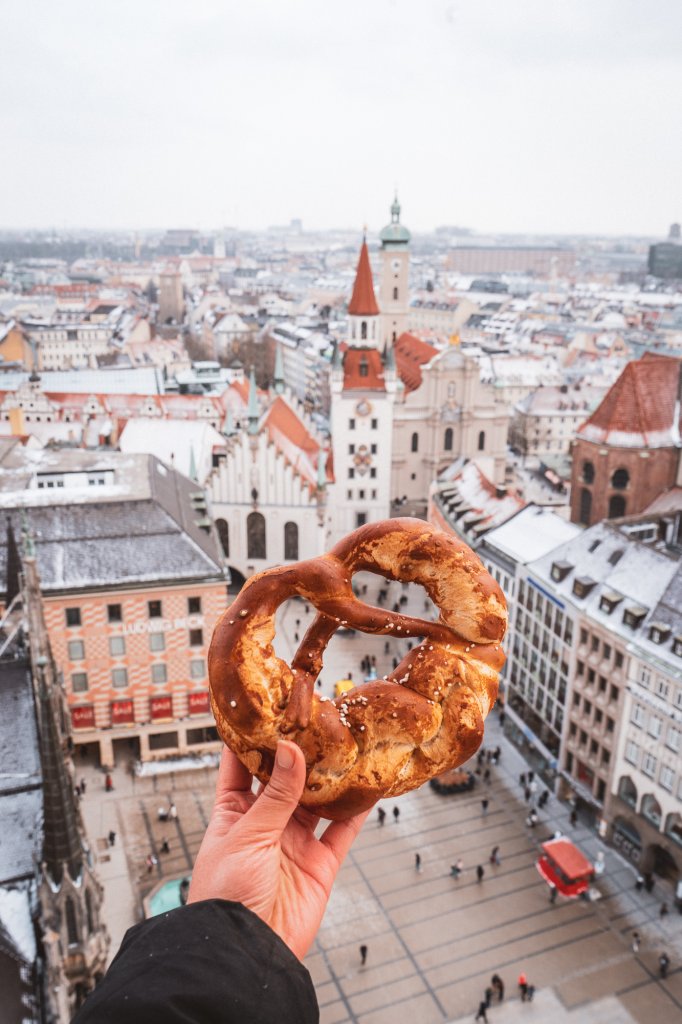
Berchtesgaden National Park
If it’s natural beauty you’re after, Germany’s Berchtesgaden National Park (near the border to Austria) is a must-visit.
Everything here is breathtaking – from the shimmering turquoise lakes and snow-flecked mountains to the adorable Berchtesgaden town center.
And, if you’re up for it, this is the ideal place to enjoy a typically Bavarian wellness weekend.
Why visit Berchtesgaden National Park when you travel Germany:
- Stunning hikes and scenery
- The glorious boat ride on Königssee to see the equally stunning Obersee
- Historic sights like Hitler’s Eagle’s Nest
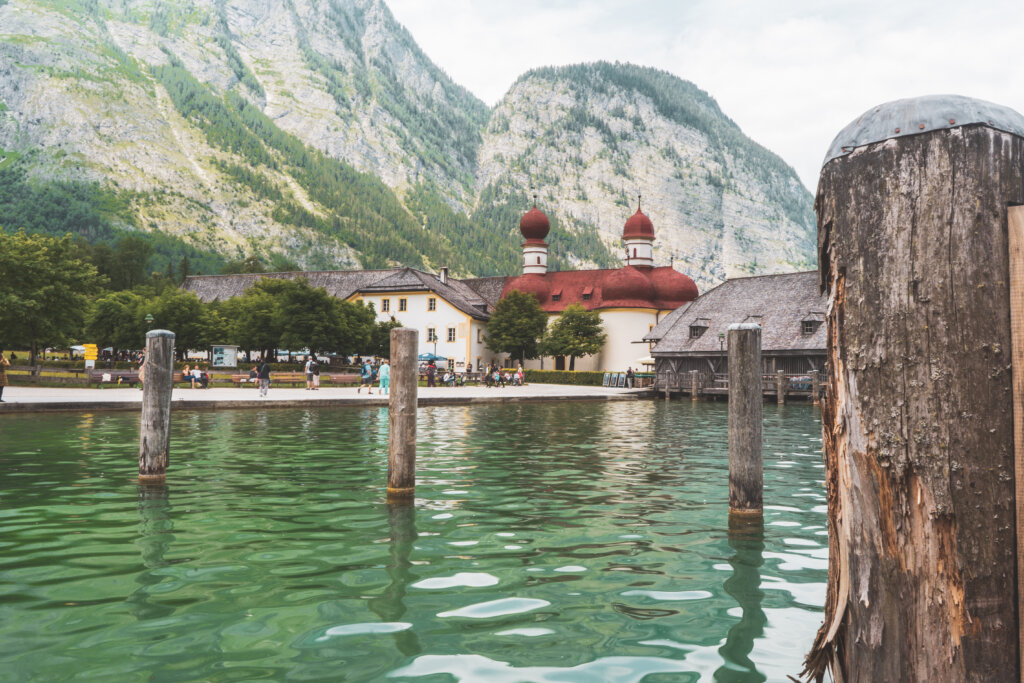
Hands down one of my favourite places to visit time and time again is Berlin.
This endlessly fascinating city is home to incredible museums, delicious food, and a unique culture that makes it distinct from the rest of the country, despite its status as capital!
Whether you’re a history nerd, an avid partyer, or a famished foodie, Berlin has plenty to offer.
Why visit Berlin when you travel Germany:
- Fascinating history
- World-class museums and attractions
- A thriving nightlife and food scene
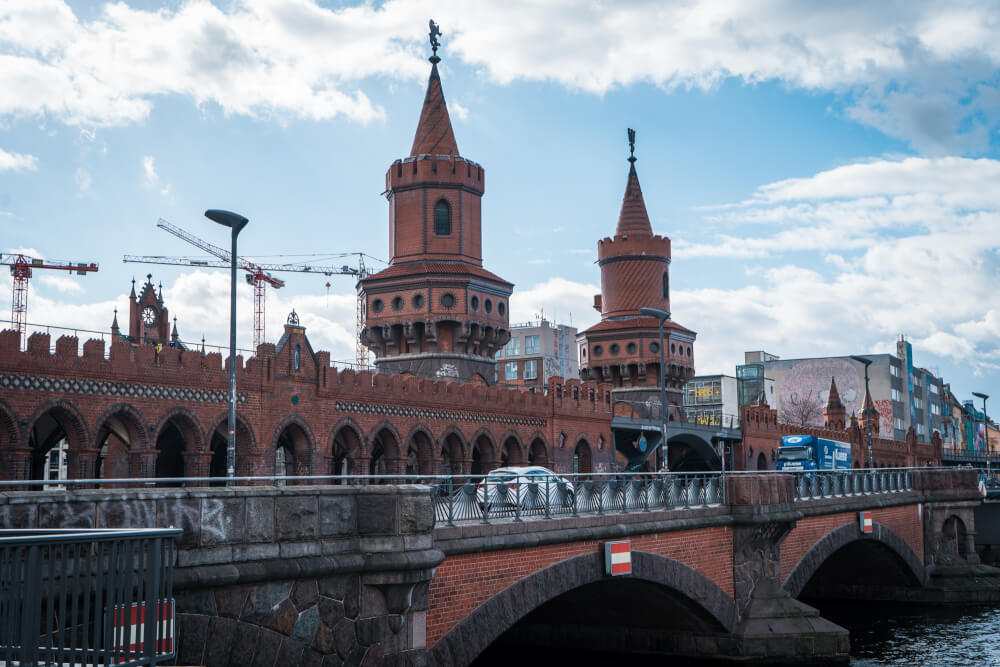
Franconia is a glorious region in northern Bavaria that is divided into Lower, Middle, and Upper Franconia.
To me, it’s one of the most underrated regions in Germany for international visitors, with an abundance of fairytale half-timbered houses, amazing beer, and unique natural landscapes.
Here are some places in Franconia that are absolutely worth visiting:
- Franconian Switzerland
- Würzburg (still haven’t been yet!)
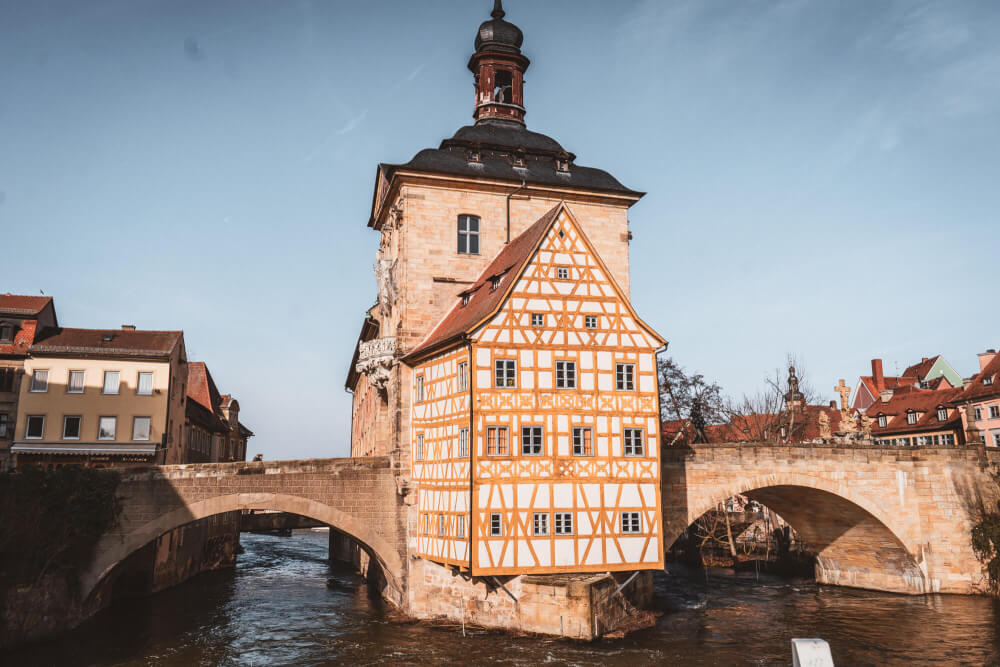
Perhaps the most idyllic entry of this list is Monschau, a sleepy but gorgeous village found near the border to Belgium.
I was lucky enough to come here for Christmas markets a few years ago, and I loved it so much, I skipped the train I’d pre-booked just so I could spend a few more hours there.
Picturesque half-timbered houses clustered around a roaring central river… oh, and a castle on a hill. Because of course they have one.
Why visit Monschau when you travel Germany:
- Super friendly locals
- Picture-perfect scenes at every turn
- Christina might cry if you don’t
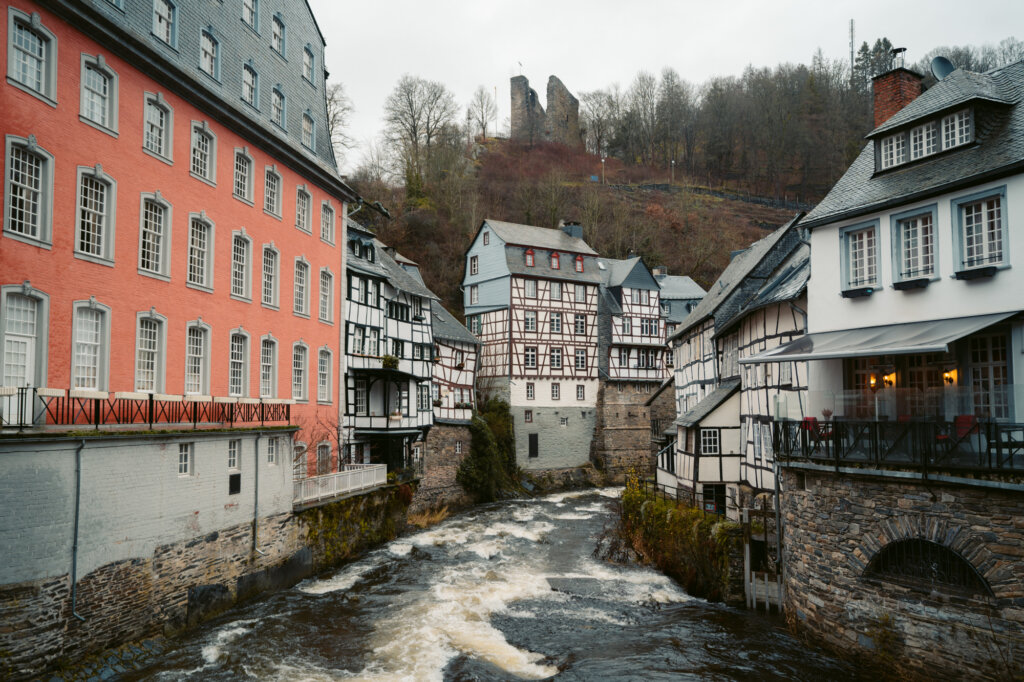
Hamburg is an amazing city I’ve had the chance to visit a few times now. It’s a lifestyle city that reminds me a lot of my hometown, Vancouver.
Home to a mix of classic and modern architecture (including the coolest opera house in the world!), as well as Germany’s #1 attraction – the adorable Miniatur Wonderland, Hamburg has a lot to offer tourists, but perhaps the best way to enjoy it is with a nice beer and sunset along the Elbe.
Why visit Hamburg when you travel Germany :
- Amazing architecture like the Elbphilharmonie
- Fresh and tasty seafood (and a booming foodie scene!)
- A fun, vibrant vibe
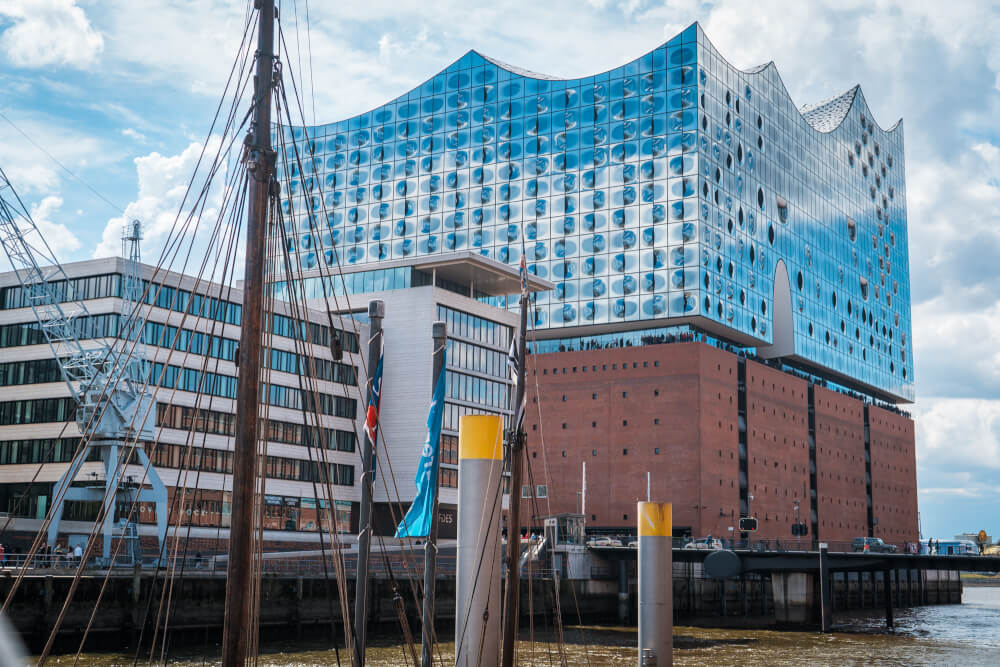
Dresden is one of the most beautiful cities in Germany, and its beauty is all the more astounding when we consider that much of the city was destroyed completely in WWII.
After decades of reconstruction however, Dresden once again shines with its former glory, establishing itself as one of the most important cultural hotspots in Germany.
… and all only a stone’s throw from Saxon Switzerland, one of the most beautiful natural wonders in the country!
Why visit Dresden when you travel Germany :
- Stunning architecture and sights
- World-class museums and culture scene
- Its jawdropping Christmas market (the oldest one in the country!)
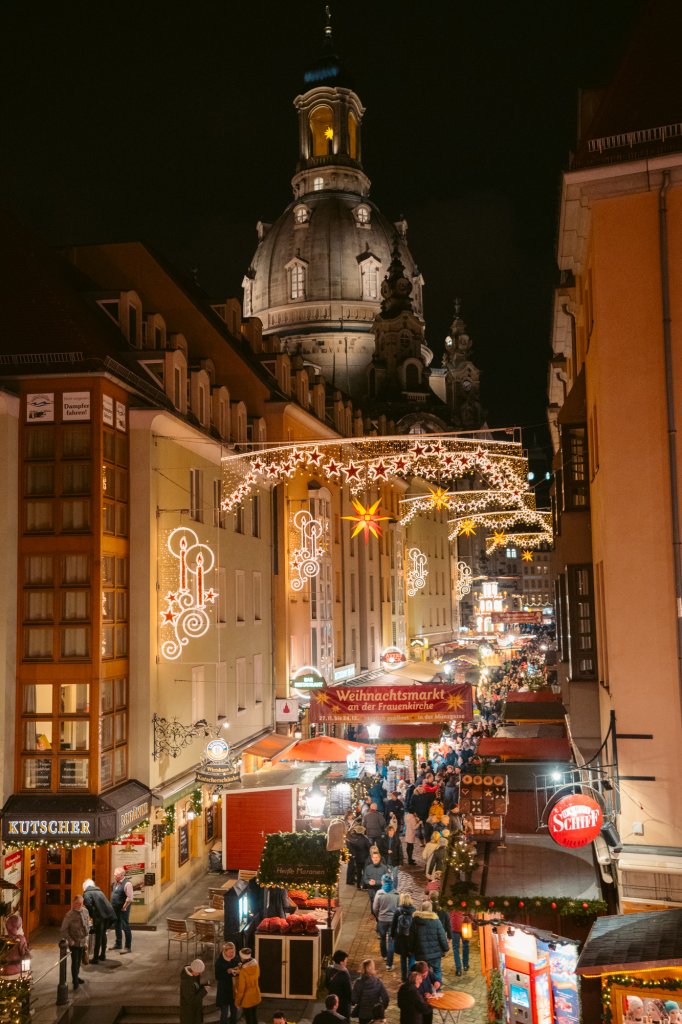
Stuttgart (and its Surrounding Area)
Stuttgart is the biggest city (and capital) of the German state Baden-Württemburg.
It’s perhaps best known as the ‘cradle of the automobile industry’, which explains why it’s home to not just one, but two car-centric museums: one belonging to Mercedes-Benz, and one to Porsche.
Besides cars though, the area around Stuttgart offers up some of the cutest small towns you can find in Germany, all easily reachable by public transport, meaning you get the best of all worlds during a visit here.
Why visit Stuttgart and the surrounding area when you travel Germany:
- Fairytale towns like Esslingen, Ludwigsburg, and Tübingen
- Stuttgart’s Stadtbibliothek, one of the most unique and beautiful libraries in the world
- Lots of fun events like Stuttgart’s Christmas Market and the Cannstatter Volksfest
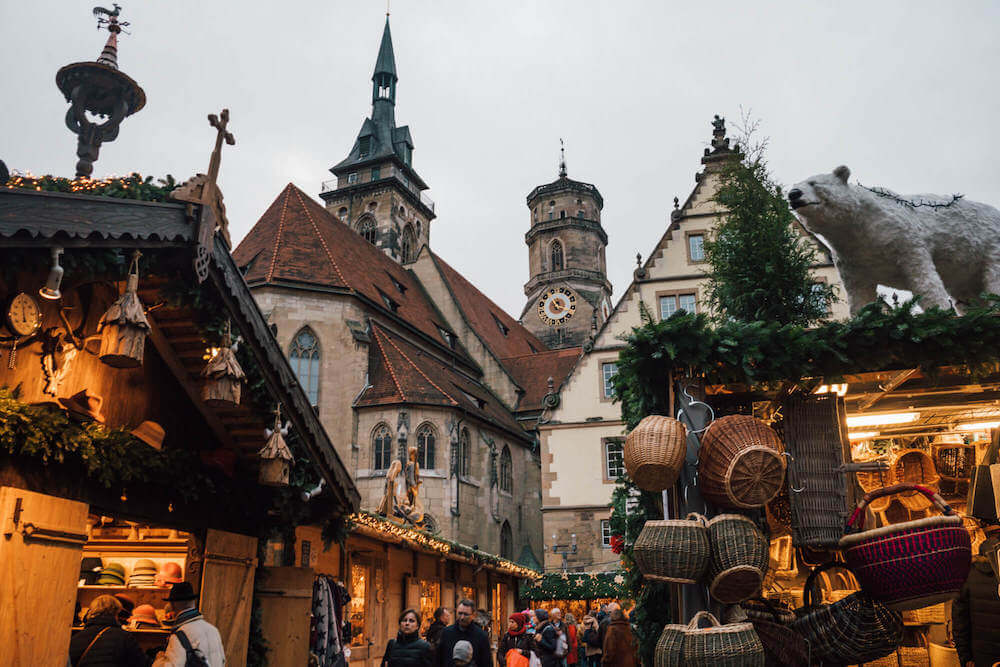
Thuringia is a state often overlooked by international tourists, but if you’re looking for a truly charming German escape, its capital Erfurt makes an excellent choice.
This beautiful city is famed for its unique Krämerbrücke, which is a gorgeous medieval bridge lined with residential buildings.
But that’s not all – there’s also an impressive cathedral, an imposing fortress, and surprises waiting on every corner… quite literally, because Erfurt is the HQ of the German children’s channel KiKA, and there’s plenty of fun statues of famous characters scattered around town.
Why visit Erfurt when you travel Germany:
- Krämerbrücke, the longest inhabited bridge in Europe
- Quirky and fun children’s channel sculptures all over the city
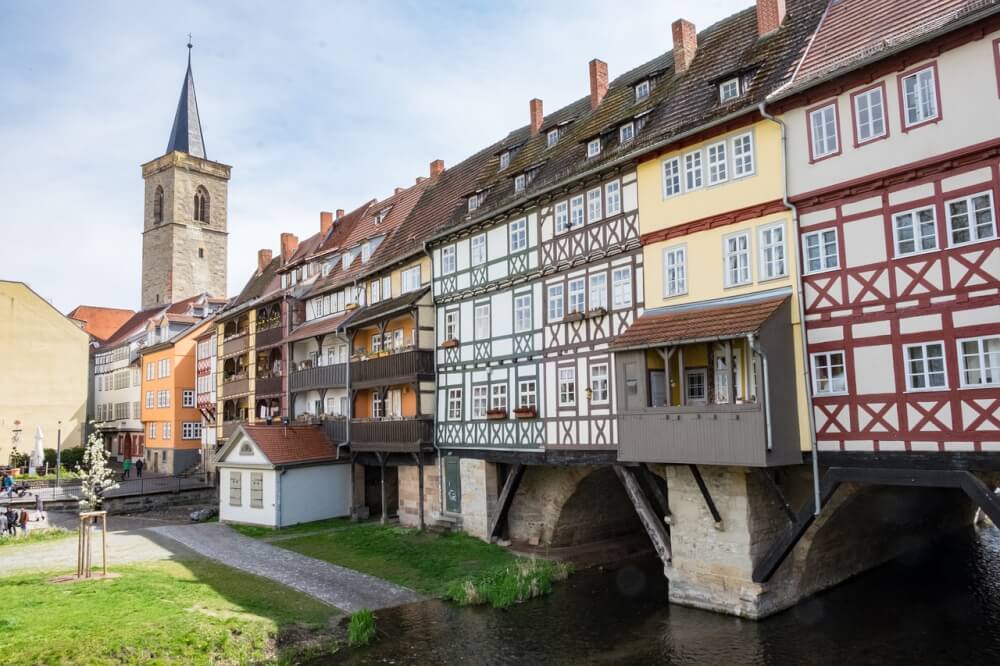
Cologne, to me, is a city synonymous with fun and celebration. While at first glance, it might not rank among the “prettiest” places to visit in Germany (much of it was destroyed in the war), it still boasts several impressive landmarks and sights, like the epic Cologne Cathedral.
Where Cologne really shines though is during special events – the Christmas markets here are some of the best I’ve been to in my entire life, and the Karneval celebrations… well, those are truly epic!
Why visit Cologne when you travel Germany:
- Bucket list events like the Cologne Christmas Market and Kölner Karneval
- The iconic Kölner Dom (Cologne Cathedral), one of the most famous churches in the world
- Fun-loving locals who are among the friendliest I’ve ever encountered in Germany
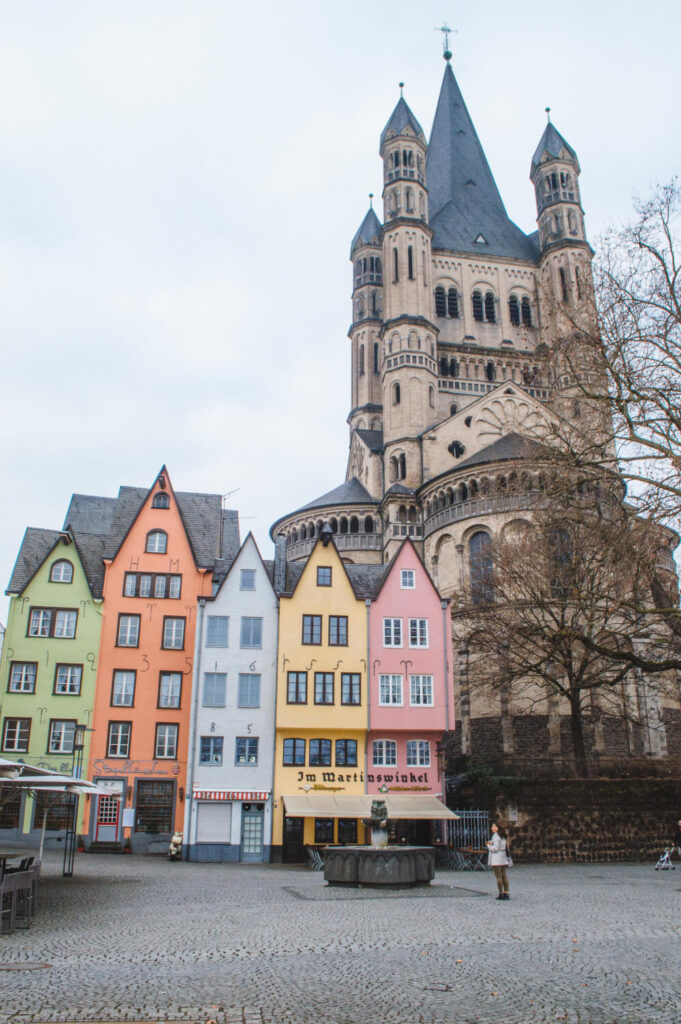
Last but not least, we have Hannover, a city which (in my opinion) is one of the most underrated cities in Germany where tourism is concerned.
Locally, people often joke that Hannover is one of the most boring cities in Germany, but I don’t think that’s true at all. One quick look and you’ll find a stunning palace within the city, an architecturally impressive Town Hall (with a unique elevator offering epic views), and a cool laidback vibe that many compare to what Berlin was like decades ago.
Here are some awesome things to do in Hannover.
Why visit Hannover when you travel Germany:
- Its gorgeous New Town Hall
- The stunning Herrenhausen Palace and its gardens
- A fun, laidback city vibe
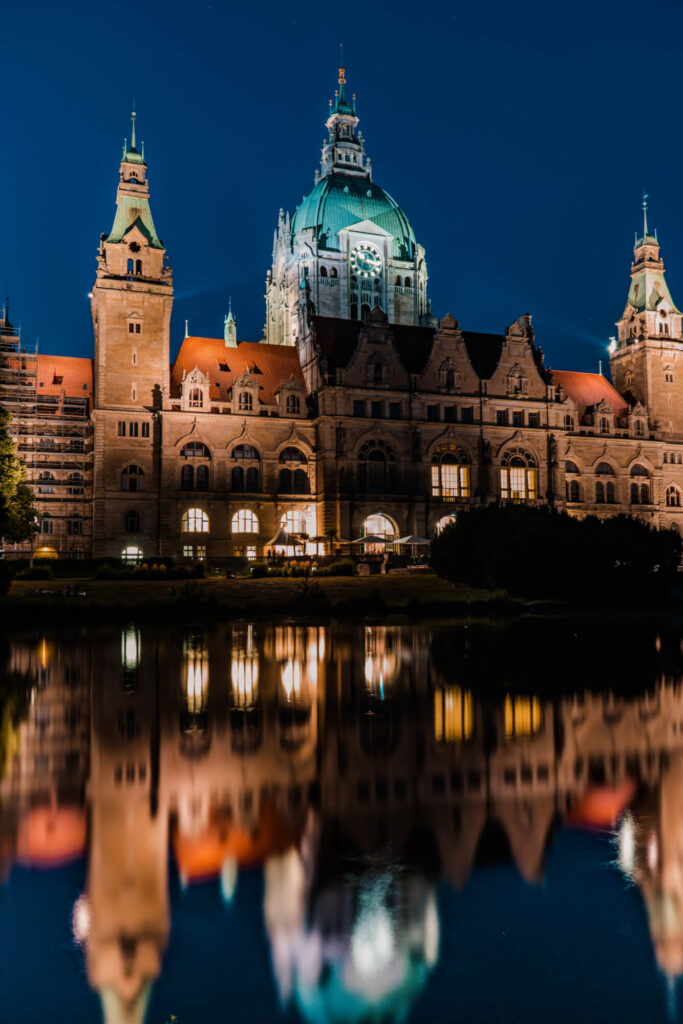
Bucket List Experiences in Germany
Germany is full of incredible bucket list experiences. Here are a few of my favourites:
Christmas Markets
German Christmas markets are the stuff of bucket list dreams.
If you adore Christmas, a German Xmas market trip needs to make it on your bucket list, because nobody captures Christmas coziness and joy quite like the Germans do.
The best part (besides the droolworthy assortment of German Christmas Market foods ) is that you’ll find Christmas markets in just about every city, town, and even the smallest of villages, each with their own unique take on traditions.
Trust me, you could never get bored of visiting these.
Here are some full guides to the Christmas markets I’ve visited in Germany:
- Munich’s Christmas Markets
- Berlin’s Christmas Markets
- Cologne’s Christmas Markets
- Esslingen Christmas Market
- Ludwigsburg Christmas Market
- Karlsruhe Christmas Market
- Düsseldorf Christmas Market
- Nuremberg Christmas Market
- Essen Christmas Market
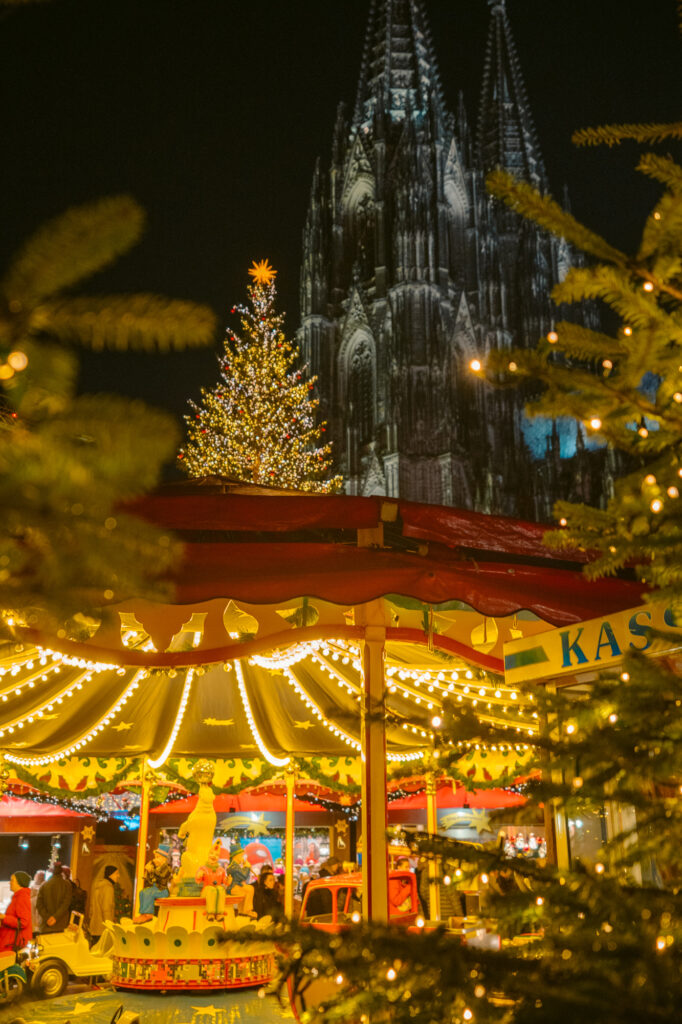
Oktoberfest
Trust me – Oktoberfest , AKA the world’s largest beer festival, is reason enough to make a trip to Germany.
Typically celebrated annually in Munich, this is one of the most incredible events in the world, with millions of people attending, millions of beer served, and a guaranteed recipe for making memories to last a lifetime.
… If you can remember anything after 5L of beer that is.
Read my full Oktoberfest guide for more details.
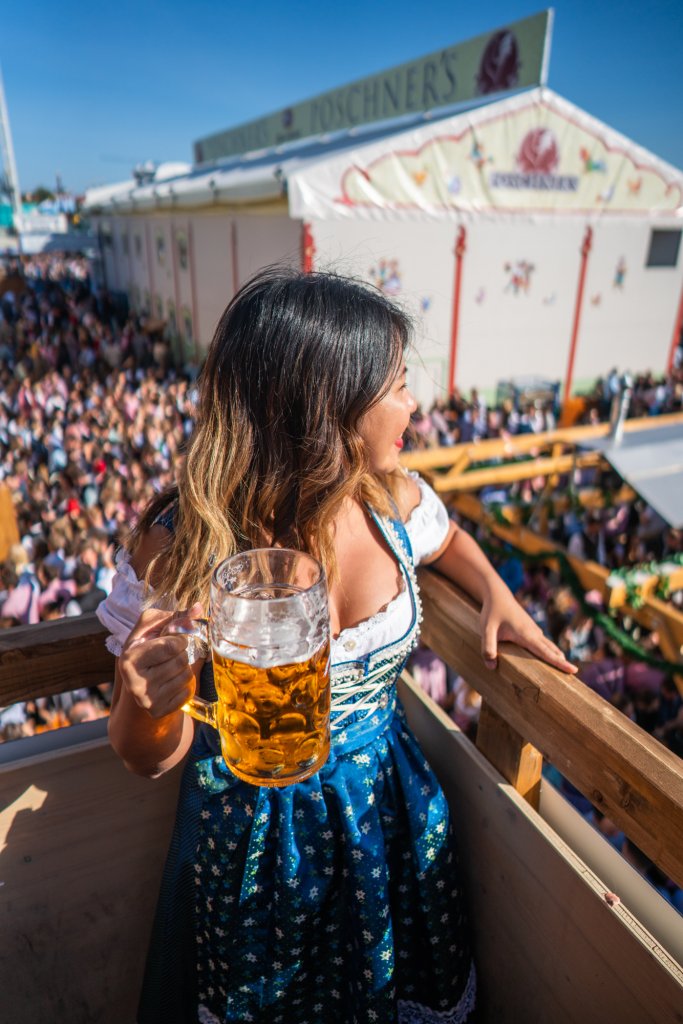
Visiting Fairytale Castles
If you love castles, I recommend avoiding Germany……. because you might just combust from sheer fangirl joy.
Seriously, Germany is every castle lover’s kryptonite, with elegant palaces and fairytale castles in the thousands. If you’re a Disney gal like me who grew up dreaming of happily ever afters, pack a ballgown and head to Germany ASAP.
I promise you won’t be disappointed.
Here are some castles that you must visit in Germany:
- Neuschwanstein Castle
- Nuremberg Castle
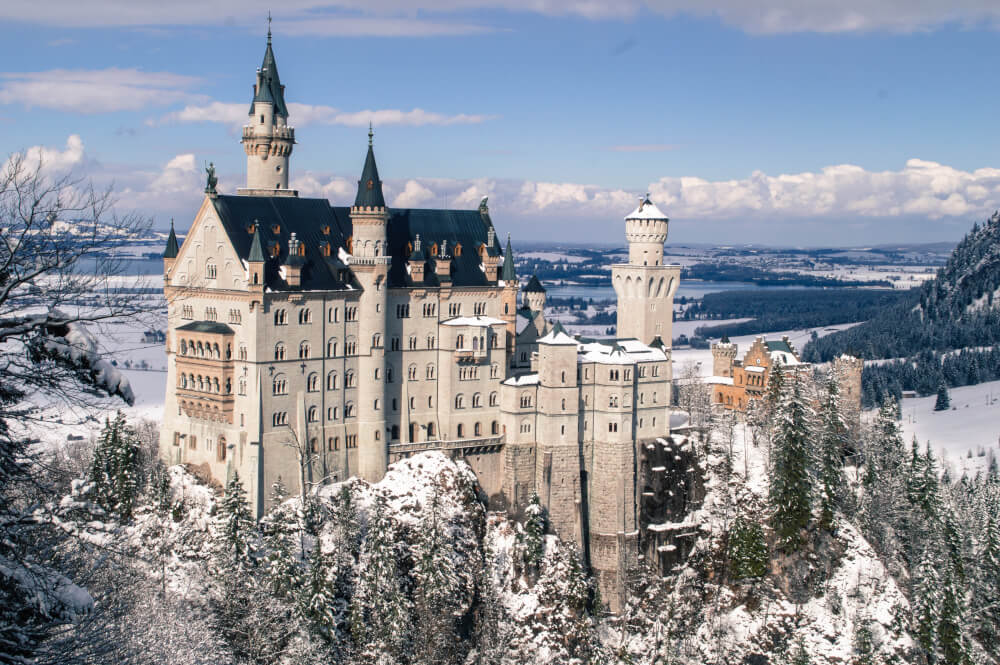
The Cherry Blossoms in Bonn
The cherry blossoms in Bonn (also the birthplace of Beethoven and gummy bear legend, Haribo) are absolutely spectacular, and 100% worth visiting in Spring time. In fact, I’d even say they’re one of the best things to see in Europe at Spring time.
Yes, you, too, can come frolic in these tunnels of pink! Here is my guide on where to find cherry blossoms in Bonn.
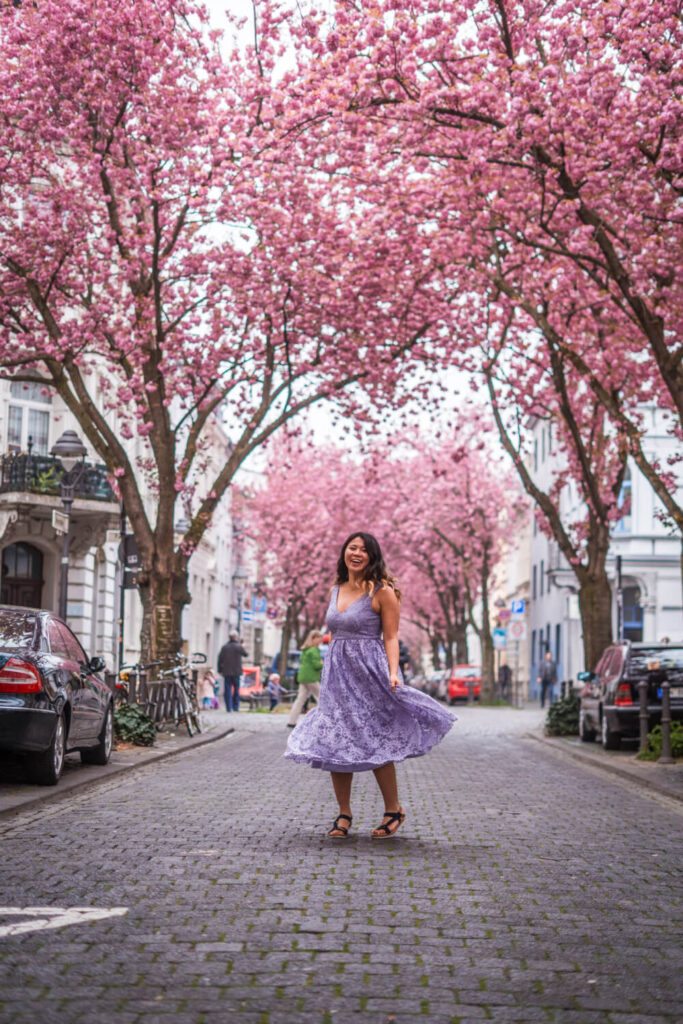
Karneval, Fasching, Etc.
Carnival Season is one of the best times to visit Germany if you’re looking for a party.
The grandest celebrations take place just before Lent, and are celebrated throughout the country, although the festivites in North-Rhine Westphalia are probably the best known.
My top recommendation? Go celebrate in Cologne, where the Kölner Karneval draws millions of visitors every year.
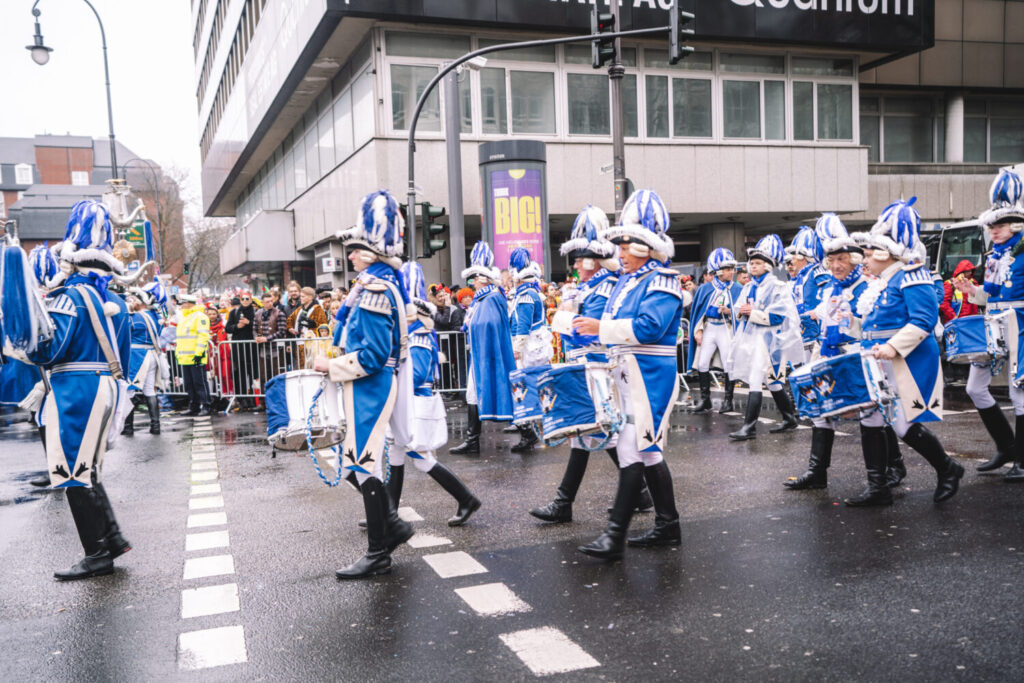
My Recommended Germany Itineraries
Germany is a huge country with a massive diversity in sights… so how can you organize your time efficiently and make the most of your trip? Here are some German trip itinerary ideas…
Germany itinerary ideas for a taste of everything:
- Southern Germany Classic: Munich, the Allgäu (for Castles!), Garmisch Partenkirchen, Berchtesgaden National Park, Stuttgart & Area, Black Forest
- Eastern Germany Classic: Berlin, Dresden, Saxon Switzerland
- Western Germany Classic: Aachen, Monschau, Eifel National Park
- Northern Germany Classic: Hamburg, Bremen , Lübeck, Kiel, Sylt
- The Rhine River Classic: Mainz, Koblenz, Burg Eltz, Cochem, Bonn, Cologne, Düsseldorf
- The Harz Mountains Experience: Harz Mountains, Goslar, Wernigerode, Quedlinburg
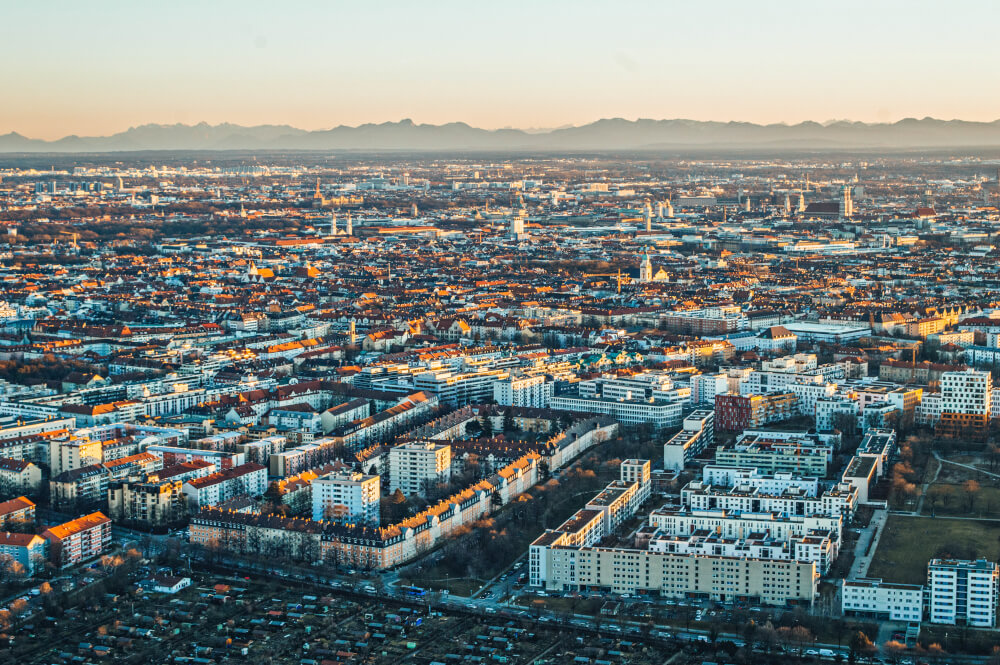
Germany itinerary ideas for city breakers and culture hunters:
- The Big City Tour: Berlin and Munich (a 4 hour express train connects them)
- The BaWu Special: Stuttgart, Ludwigsburg, Tübingen, Esslingen, Heidelberg
- The Bavaria Special: Munich, Nuremberg, Bamberg, Würzburg, Bayreuth
- The Saxony Special: Leipzig, Görlitz, Dresden
- The Rhine City Hop: Bonn, Cologne, Düsseldorf
- The Romantic Villages Hop: Würzburg, Dinkelsbühl, Nördlingen, Rothenburg ob der Tauber, Füssen
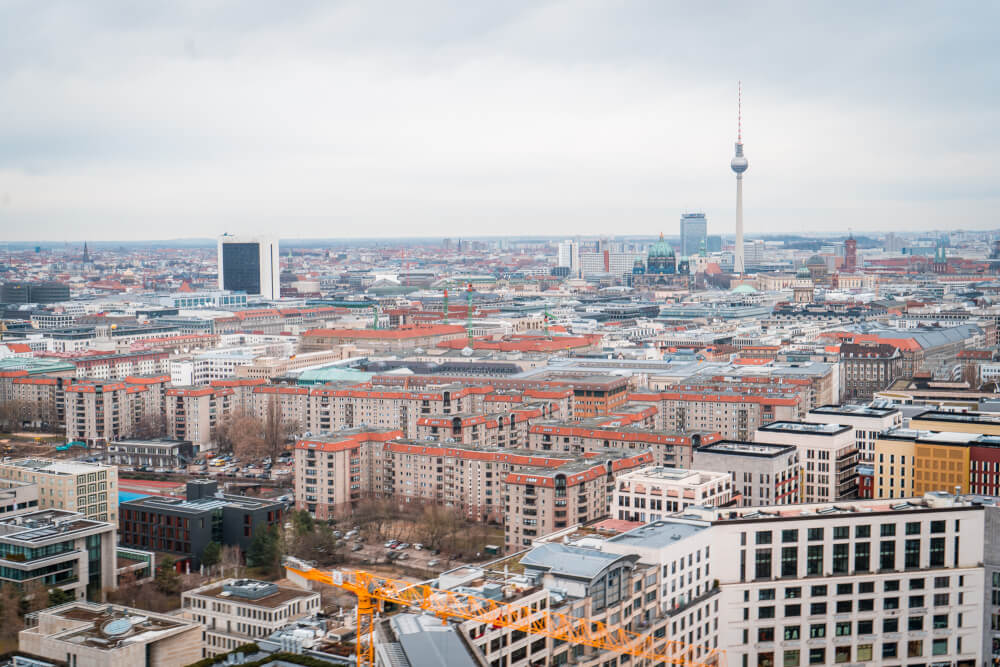
Germany itinerary ideas for nature lovers:
- Southern Germany Nature Itinerary: Berchtesgaden National Park, Garmisch-Partenkirchen, the Black Forest and Lake Constance (Bodensee)
- Bavaria’s Best Nature Itinerary: Berchtesgaden National Park, Garmisch-Partenkirchen, Munich’s Lake Region, Franconian Switzerland, Danube Gorge
- Eastern Germany Nature Itinerary: Dresden and Saxon Switzerland National Park
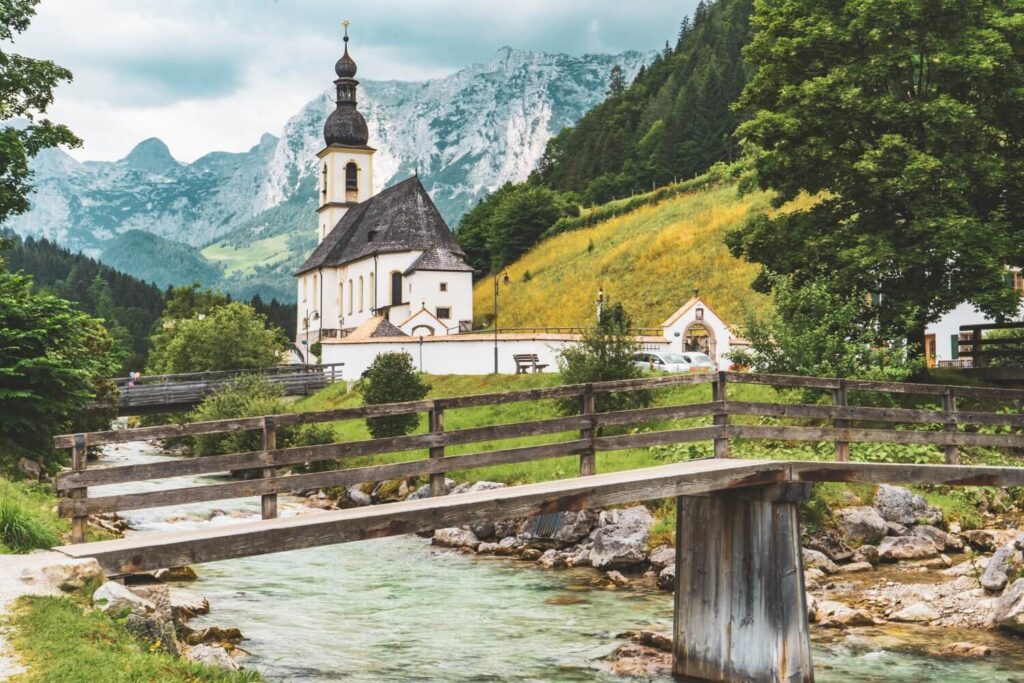
My Top Germany Travel Tips
- If you’re overwhelmed by transport options, Omio is a great resource for comparing trains, buses and flights in Germany at the same time.
- If travelling by train, look into group discount tickets like the Bayern Ticket which give you unlimited train travel for one day on regional trains. It can save you a TON of money.
- If you are traveling to multiple countries nearby (i.e. Switzerland), a Eurail pass might save you money.
Accommodation:
- Booking.com is a great place to search up hotels, and filtering by Free Cancellation allows you to book without paying upfront
- Airbnb can be a very affordable alternative for longer stays/bigger groups
Attractions and Tickets:
- GetYourGuide is a great site for finding tours and attraction tickets
- City passes like the Munich City Pass , Berlin Pass , and the Cologne Card can save you a LOT of money if you plan to visit many tourist attractions in a short time
- If you’re trying to find specific info about a place, try using Google Translate to search in German because German versions of sites always have more info
If you’re past the planning stage and heading to Germany soon, make sure you read this before you go:
- Hilarious must-knows before you visit Germany
More Germany Travel Reads
Feeling inspired to visit Germany after reading all that?
As you can (probably) tell, I’ve written extensively about Germany.
So, here are some more articles that might pique your interest:
- Unique Things to do in Germany (That You Can’t Do Anywhere Else)
- The Best Christmas Markets in Germany
- Hilarious Must-Knows Before You Visit Germany
My Go-To Travel Favourites:
🧳 Eagle Creek: My favourite packing cubes
💳 Wise: For FREE travel friendly credit cards
🍯 Airalo: My go-to eSIM
🏨 Booking.com: For searching hotels
📷 Sony A7IV: My (amazing) camera
✈️ Google Flights : For finding flight deals
🌎 WorldNomads: For travel insurance
🎉 GetYourGuide: For booking activities
4 thoughts on “The Only Germany Travel Guide You’ll Ever Need”
i found myself reading almost every post in your website for days and days and i ABSOLUTELY LOVE IT and adore and thank you for spending so much time and effort to make it so helpful, informative and fun to read. you have helped me plan my trip to munich in december and i cant wait to visit just because of your enthusiasm 🙂
We would like to Thank you for sharing such a beautiful blog! Very informative.
This Germany Travel Guide truly captures the multifaceted beauty of Deutschland, a country that has something to offer to everyone, from culture enthusiasts to nature lovers. Your personal anecdotes from living in Munich make it come alive, making me yearn for a taste of that amazing beer you’ve mentioned, and a wander around the English Garden! The varied seasonal highlights emphasize how Germany is a year-round destination, offering uniquely charming experiences, from the festive winter Christmas markets to the lively summer festivals. It’s heartening to know that navigating around the country is convenient, making it possible to explore its picturesque small towns and vibrant cities. This guide is a treasure trove for anyone planning to travel to Germany – it gives a well-rounded view of the country, infused with personal insights, which makes it even more valuable. I’m particularly intrigued to visit Munich, the city you so passionately call home.
As a Berliner, I can’t agree more with this guide. Germany truly is a delightful mix of tradition and innovation, natural beauty and urban charm, hearty cuisine and diverse cultures. Moving around in Germany is indeed quite convenient thanks to the well-organized public transportation system, including trains, buses, and trams. And yes, English is widely spoken in major cities, so communication shouldn’t be a problem for travelers. As for the varied dialects across regions, it just adds to the unique charm of exploring this beautiful country. Safe travels, fellow adventurers!
Leave a Comment Cancel reply
By using this form you agree with the storage and handling of your data by this website. *
Security Alert May 17, 2024
Worldwide caution, update may 10, 2024, information for u.s. citizens in the middle east.
- Travel Advisories |
- Contact Us |
- MyTravelGov |
Find U.S. Embassies & Consulates
Travel.state.gov, congressional liaison, special issuance agency, u.s. passports, international travel, intercountry adoption, international parental child abduction, records and authentications, popular links, travel advisories, mytravelgov, stay connected, legal resources, legal information, info for u.s. law enforcement, replace or certify documents, before you go.
Learn About Your Destination
While Abroad
Emergencies
Share this page:
Crisis and Disaster Abroad: Be Ready
What the Department of State Can and Can't Do in a Crisis
Information for U.S. Citizens about a U.S. Government-Assisted Evacuation
Traveler's Checklist
Safety and Security Messaging
Best Practices for Traveler Safety
Staying Connected
Smart Traveler Enrollment Program (STEP)
Traveler Information
LGBTQI+ Travelers
Adventure Travel
High-Risk Area Travelers
Travelers with Dual Nationality
Journalist Travelers
Faith-Based Travelers
Pilgrimage Travelers (Hajj and Umrah)
U.S. Students Abroad
Cruise Ship Passengers
Women Travelers
Travelers with Disabilities
Older Travelers
U.S. Volunteers Abroad
Travelers with Pets
Travelers With Firearms
Travel Agents
Travel Safety - Race and Ethnicity
U.S. Travelers in Europe's Schengen Area
Your Health Abroad
Insurance Coverage Overseas
Driving and Road Safety Abroad
Customs and Import Restrictions
Information for U.S. Citizens in Russia – Travel Options Out of Russia
Lodging Safety
Paris 2024 Olympics and Paralympics
In Europe's Schengen area , your passport must be valid for at least six months at the time of your entry. At present, the Schengen area includes most European Union (EU) countries, except for Cyprus and Ireland.
If you are transiting through Canada or the United Kingdom (UK) enroute to the Schengen area : your passport must be valid for at least six months, even though Canada and the UK do not themselves have the six-month rule. If your passport will expire within six months, airlines may not let you board your onward flight to Europe.
Traveling in Europe
If you plan to travel in Europe, you need to know about the Schengen Borders Agreement, which allows you to move freely within a number of countries without border checks. Tourists, exchange students, and people visiting for business from certain countries, like the United States, can travel in the Schengen area for up to 90 days. The Schengen area includes most EU countries, except for Cyprus and Ireland. It also includes four non-EU countries: Iceland, Norway, Switzerland, and Liechtenstein.
Before you travel to the Schengen area, we recommend you do the following:
- Check the expiration date on your passport book carefully before traveling to Europe. Ensure your passport book is valid for at least six months when you enter the Schengen area. This is especially important for minors under age 16 as their passports are only valid for five years. In contrast, U.S. citizen adults aged 16 and older receive passports that are valid for 10 years.
- Always carry your passport book with you when traveling to another country in the Schengen area. Even if there is no border check at that time, officials may reinstate border controls without notice.
- Be prepared to explain your purpose of travel.
- Be prepared to provide proof of sufficient financial resources for the visit.
- Comply with other entry requirements for each country you will visit or transit.
On our Country Information pages , you can find passport validity requirements and other important information for your destination country. If your passport does not meet the Schengen requirements, you may be:
- Refused boarding by the airline at your point of origin or while transferring planes.
- Denied entry when you arrive in the Schengen area, regardless of how long you will stay.
An immigration official will determine if you qualify for visa-free entry to the Schengen area when you first cross any external Schengen border. You will have to present your passport at that time. The officer may deny your entry if you do not qualify.
You should also check passport validity requirements if traveling onward from the Schengen area to a country outside the Schengen area. You can find this information in our Country Information pages.
HOW LONG CAN I REMAIN?
- With a valid U.S. passport book, you can stay up to 90 days in the Schengen area for tourism or business during any 180-day period. You must wait an additional 90 days before applying to re-enter the Schengen area.
- If you plan to stay in the Schengen area longer than three months, contact the embassy of the country where you plan to spend the majority of your time and apply for a visa.
Countries in the Schengen area may reinstate temporary internal or external border control without notice. U.S. citizens should carry their U.S. passport book at all times when entering or leaving the Schengen area. They should also bring it when traveling between Schengen countries.
How can the U.S. government help me if border officials do not let me enter?
- We can give you the contact information of foreign embassies of the countries you wish to visit.
- We can provide information about hiring an English-speaking foreign attorney overseas if you choose to do so.
- Note: We cannot influence a foreign government’s decision about allowing you to enter. We cannot intervene in another country’s criminal or administrative procedures.
What countries are members of the Schengen Borders Agreement?
Click on the country name for more information.
Bulgaria (entering in March 2024)
Czech Republic
Liechtenstein
Netherlands
Romania (entering in March 2024)
Switzerland
Enroll in STEP

Subscribe to get up-to-date safety and security information and help us reach you in an emergency abroad.
Recommended Web Browsers: Microsoft Edge or Google Chrome.
Learn about your destination
Make two copies of all of your travel documents in case of emergency, and leave one with a trusted friend or relative.
External Link
You are about to leave travel.state.gov for an external website that is not maintained by the U.S. Department of State.
Links to external websites are provided as a convenience and should not be construed as an endorsement by the U.S. Department of State of the views or products contained therein. If you wish to remain on travel.state.gov, click the "cancel" message.
You are about to visit:
💡Travel benefits explained
🚄 db ticket euro 2024, 🌍 interrail pass euro 2024, 🚋 36 hour travel pass, uefa euro 2024: ticket holder travel benefits.
Monday, June 3, 2024
Article body
Did you know?
Travelling by train and public transport will be the most convenient and sustainable option to get around. Luckily, EURO 2024 ticket holders will have access to discounted national and international train tickets, as well as a 36 Hour Travel Pass for public transport!
- DB Ticket EURO 2024 – Train travel within Germany
- Interrail Pass EURO 2024 – Train travel across Europe
- 36 Hour Travel Pass – Public transport in the region
To make use of your travel benefits, you will need your Fan Pass . The Fan Pass is brand new for EURO 2024 and provides access to exclusive perks which will enhance your experience on-site. Your Fan Pass is free and now available for all ticket holders on the UEFA EURO 2024 app .
Plan your journey on the DB Website or DB Navigator App to see what services you’ll be travelling on.
• Purchase a DB Ticket EURO 2024 for single journeys between host cities that involve long-distance services such as IC (InterCity), ICE (InterCity Express), or EC (EuroCity) trains.
• Purchase a Interrail Pass EURO 2024 for international arrival to Germany and during your stay in Germany for journeys that involve long-distance services such as IC, ICE, or EC trains.
• Use your free 36 Hour Travel Pass on matchday and the day after to travel within the city and on slower services within the region ( see map below ). If you’re travelling between Cologne, Düsseldorf, Dortmund and Gelsenkirchen, you can simply use your 36 Hour Travel Pass, as long as your journey doesn’t include ICE, IC or EC services.

4, 5 or 7-day passes: 17 January – 13 July
10 or 15-day passes: 17 January – 8 June
33 European countries
This includes the option to travel in your country of residence, but is limited to two journeys (one to leave and one to return).
Full list of railway operators
How it works
- Take as many trains as you like on each of your travel days.
- To use and activate your Interrail Pass, download Interrail’s Rail Planner App .
- Your Interrail Pass EURO 2024 is only valid in combination with your EURO 2024 Fan Pass . All ticket holders will have access to a Fan Pass for free. You will need to show your Fan Pass when travelling on the train – just like a railcard.
- For some trains, it is mandatory to book seat reservations . Be sure to make them early, as trains fill up quickly. Please check the reservation policy of each train you plan to take.
- Trains will be busy, so it’s strongly recommended to book a seat reservation even if it's not mandatory. Otherwise, you may need to stand.
❓ FAQs: Interrail Pass EURO 2024
Your Interrail Pass EURO 2024 can only be used to travel between 9 June and 21 July.
Depending on which option you choose, it is either valid for a month within this period (4, 5 and 7-day passes) or the full period (10 or 15-day passes).
The end of the travel period is 21 July for all passes , even if you activate your pass less than a month before this date. For example, if you choose to activate your pass on 13 July to travel to the final in Berlin, your Interrail Pass EURO 2024 will become invalid after 21 July.
No. It’s only available for European citizens (not German residents) and non-Europeans with an official residence in Europe. German residents can benefit from the DB Ticket EURO 2024 for train travel within Germany instead.
You can purchase one pass per EURO 2024 match ticket.
No, only match ticket holders are entitled to use the Interrail Pass EURO 2024 for travel. Your Interrail Pass EURO 2024 is only valid in combination with the EURO 2024 Fan Pass.
You can either travel together, or they can transfer their match ticket to you. Once you have a match ticket in your UEFA Mobile Ticket app , you can access your EURO 2024 Fan Pass in the UEFA EURO 2024 app . On board the train, simply show your Fan Pass together with your Interrail Pass.
You will need to show your free EURO 2024 Fan Pass on each train. The Fan Pass will allow you to prove that you have a match ticket, even when match tickets have not been sent to your mobile phone.
No, the Interrail Pass EURO 2024 is only available to match ticket holders. If you don't have a match ticket, you can purchase any other regular Interrail Pass.
The EURO 2024 Fan Pass is brand new and will provide you with access to exclusive perks for your tournament experience. The Fan Pass is available for free on the UEFA EURO 2024 app .
On the train, the Fan Pass works just like any other railcard or discount card. Show it to the conductor together with your valid Interrail Pass EURO 2024.
Yes, you can buy one pass per match ticket. However, if you’re going to multiple matches, purchasing a single Interrail Pass EURO 2024 with more travel days could be a better option.
No, the Interrail Pass EURO 2024 is non-refundable and non-exchangeable.
No, the Interrail Pass EURO 2024 is personalised.
Check out the full list of railway companies covered on the Interrail website.
The Interrail Pass EURO 2024 allows for up to two journeys in your home country: one to leave and one to return.
For all questions relating to the Interrail Pass EURO 2024, please contact Interrail:
For questions relating to your EURO 2024 match ticket, have a look at the Ticket FAQs .
Match ticket holders are entitled to a 36 Hour Travel Pass for the entire regional public transport network at no additional cost.
⏳ Validity period
From 06:00 on your matchday until 18:00 the following day.
🎫 How to get your pass
Your 36 Hour Travel Pass is included in your free Fan Pass .
- Download your Fan Pass on the EURO 2024 App .
- Simply hop on board and have your Fan Pass ready to show to inspection staff if requested
- No need to scan the Fan Pass before boarding the metro, train or bus.
🗺️ Travel area

Plans of holiday makers across Europe in disarray after German travel company collapse
Irish customers of loveholidays and others caught up in unexpected liquidation of fti, germany’s third largest tourism operator.
FTI, which is the third largest tourism operator in Germany with around 200 subsidiaries, shocked the leisure travel sector when went into liquidation on Monday. Photograph: Steve Parsons/PA Wire
The travel planes of thousands of holiday makers across Europe including people in Ireland are in disarray following the collapse of a leading German tour operator earlier this week.
FTI, which is the third largest tourism operator in Germany with around 200 subsidiaries, shocked the leisure travel sector when went into liquidation on Monday after a refinancing deal collapsed.
The initial filing involved FTI’s tour operator brand, but it warned that “corresponding applications will be filed for other group companies”.
One of its subsidiaries is the UK-based YouTravel which supplies accommodation to multiple travel agents in Ireland as well as online travel agents which have a significant footprint here, including LoveHolidays.
‘People are not reading your stuff’ is the worst thing you can say to journalists
:quality(70):focal(3812x2062:3822x2072)/cloudfront-eu-central-1.images.arcpublishing.com/irishtimes/DFUVC76BFTDOYFTL4F32ACP6MQ.jpg)
Deposits war heats up: Irish savers starting to see much higher rates offered
:quality(70)/cloudfront-eu-central-1.images.arcpublishing.com/irishtimes/EVGJNMAAPNFA3PXEXHSPELQ3HY.jpg)
‘I remember what it was like to count my pennies. Money allows me to live a life I’ve always dreamed of’
:quality(70)/cloudfront-eu-central-1.images.arcpublishing.com/irishtimes/JHHDISEW4JBGRKCOURVVUKPRCE.jpeg)
How new rules could mean fewer accommodation options for tourists
:quality(70)/cloudfront-eu-central-1.images.arcpublishing.com/irishtimes/TX6GDDBMXJA5TF3RL6Z46BLAI4.jpg)
All accommodation bookings made via YouTravel until later this month have been cancelled while customers already in destinations overseas are being asked to pay the hotel directly for their stay.
In a statement on its website, YouTravel said that “it goes without saying that this has an impact on Youtravel.com. For arrivals until June 14th (inclusive), we have taken to the decision to cancel to avoid guests arriving and not having a booking or being asked to pay again whilst we navigate through these challenging times.”
The UK travel company LoveHolidays which does a significant amount of business in the Republic, posted an update on its website which said that “a very small portion of our customers’ accommodation arrangements will be affected. However, we’re working hard to honour these bookings with other suppliers to minimise disruption to any holidays.”
It advised people with upcoming holidays that “there is nothing you need to do. Our team is working hard to honour any impacted bookings with another partner to make sure your holiday goes ahead as seamlessly as possible.”
Paul Hackett of Irish-based online travel agency Click&Go said his staff had been “been working flat out” since Tuesday to secure all bookings.
“We have been making payments direct to hotels where the hotel says they need payment from us or they seek payment direct from the customer,” he said.
He added that there was a team of people working on the issue and “to date our clients are all fine. We are rebooking at extra costs and not passing that on, we are paying hotels direct, and we are doing all we can to minimise the impact on our customers”.
He said one customer, who had not yet travelled had to move to a different hotel, 700m from the original hotel as the booking was cancelled by YouTravel and when Click&Go went to reconfirm it, the hotel had resold the room.
“Any other bookings we have are re-protected and we absorbed the additional cost,” he said.
In response to queries from The Irish Times a spokesman from the Irish Aviation Authority said that its role in relation to customers of travel agents and tour operators “only takes effect when an entity we licence collapses. We do not licence FTI.”
He said that while FTI “may be a supplier to some entities we licence, it is for the seller of the package to resolve in the first instance or if the seller does not do so it would be for the CCPC to engage. We would only have a role if an entity collapsed because of the financial impact of the FTI collapse.”
- Sign up for push alerts and have the best news, analysis and comment delivered directly to your phone
- Join The Irish Times on WhatsApp and stay up to date
- Listen to our Inside Politics podcast for the best political chat and analysis
Conor Pope is Consumer Affairs Correspondent, Pricewatch Editor and cohost of the In the News podcast
IN THIS SECTION
How much tax do i have to pay on the sale of shares that i inherited, alarming letters and hoop jumping over paltry sum not actually owed to ptsb, commuters treat our development as a ‘park-and-ride’ facility. what can i do, chatgpt helps investors see through ‘bloated’ corporate fluff, election results: andrews, doherty, lynn boylan, ó ríordáin elected as meps in dublin, niall boylan eliminated, european election: dublin results, growing unease in sinn féin over mary lou mcdonald’s leadership after poor election results, european election: ireland south results, european election: midlands-north-west results, latest stories, jon rahm withdraws from us open due to foot injury, ireland head for the beach as ronaldo and portugal set sights on germany, us open 2024: tee times, tv details, weather forecast, players to watch, mummified remains destroyed by fire at st michan’s church in dublin.
:quality(70)/cloudfront-eu-central-1.images.arcpublishing.com/irishtimes/6BDEAESQEJH4BHNFRSVZH3W4TM.png)
- Terms & Conditions
- Privacy Policy
- Cookie Information
- Cookie Settings
- Community Standards
Euro 2024: How Germany is ramping up security for 'high-risk' England game
More than 300,000 British fans are expected to travel to Germany for the tournament, making it their highest attendance since Euro 2016 in France.

Europe correspondent @SiobhanRobbins
Tuesday 11 June 2024 09:36, UK
Please use Chrome browser for a more accessible video player

Germany is ramping up security ahead of the start of Euro 2024, with England's tie against Serbia seen by police as high risk.
The heightened security in Gelsenkirchen for England's opening group game on Sunday means fans will be served lower alcohol beer in the stadium and will not be able to drink in the stands.
Policing will be more challenging as UEFA has asked for barriers to be removed and both sides will be seated close together, with two-thirds of tickets going to mixed areas.
"I think it's a very high-risk game because of the history, because of the hooligans both sides have," Chief Inspector Christof Burghardt told Sky News.
"Serbia has many hooligans. The English guys, with alcohol, they are sometimes very aggressive. So it's a great job to do this, to prepare, so that hopefully nothing will happen."

Ahead of the game, we joined officers at a league match in Gelsenkirchen which they used as a test run.
At the gates, fans were randomly checked for weapons and booze.
More on Euro 2024

Euro 2024: Poll reveals England fans' optimism as Gareth Southgate's side prepare for Serbia match

Prince Louis offers advice to England squad ahead of Euro 2024

England starting XI vs Serbia for Euro 2024 opener: Sky Sports writers pick their Three Lions teams
Related Topics:
Inside, police watched over the crowd at the potentially volatile clash, on alert for troublemakers.
Using CCTV to surveil the crowd, they spotted a group of masked ultras gathering in the stands and carefully monitored them.
Read more: Prince Louis offers advice to England squad ahead of Euro 2024

Germany is hoping to avoid a repeat of riots that year which marred the event and resulted in more than 1,500 arrests.
Fans who breach German public order laws have been warned they could be marched to a cashpoint to pay an on-the-spot fine.
British police have been sharing intelligence and will send the largest deployment of officers since 2016.
So-called police spotters will be on hand to help tackle antisocial behaviour and drink-fuelled violence, trying to talk to fans before things get out of hand.
Read more: Man charged with 'voyeurism' at Taylor Swift's show Sunak and Starmer to face questions from Beth Rigby
Many of the worst offenders have been stopped from travelling altogether.
"We currently have approximately 2,000 people on the banning order which basically means they can't travel to tournaments and they can't go into football stadiums," explains Chief Superintendent Colette Rose, from UK Football Policing.
"Over 2,000 troublemakers away from football has made it a much safer place. When you play that out over the last eight to ten years the behaviour of football fans has been far, far better. We have no arrests in Qatar and we had very, very few arrests in the tournaments preceding that."

Policing the Euros is a complex challenge because it's not just about keeping the 2.7 million fans safe in the 10 stadiums where the games are being played, there are also the 12 million in the fan zones to look after.
Germany's interior minister, Nancy Faeser, said everything is being done to ensure the event is safe.
"You can never 100% guarantee security but we are well-prepared and remain very vigilant," she said.
Some 22,000 federal police officers will be on duty every day of the tournament.
Security is being stepped up at borders and train stations with the support of officers from other countries and 16,000 volunteers.

Keep up with all the latest news from the UK and around the world by following Sky News
In Thuringia, where England have their base camp, police have also been doing drills.
In one scenario, riot police practised stopping hooligans armed with flares and weapons on a train.
They admitted the tense global situation makes security more complex.
"In my opinion, the risk is definitely higher," said Police Director Frank Haring. "Because of current political events in Ukraine, in Russia and the conflict between Israel and the Palestinians, terrorist groups could potentially use events like the European Championship for an attack."
Be the first to get Breaking News
Install the Sky News app for free

On Friday, police arrested a man at Cologne airport on suspicion of supporting Islamic State. He's being held in custody.
In a separate incident, a police officer was killed and five other people were injured when an alleged Islamist extremist carried out a knife attack in Mannheim at the end of May.
Despite the risk, Germany says it is ready and can protect the millions of football fans coming here.
Related Topics

IMAGES
VIDEO
COMMENTS
Recent studies on early modern travel have demonstrated the central importance of apodemic literature, works providing systematic rules useful for travel and observation.2 This genre emerged in the German-speaking lands in the late * Herzog August Bibliothek, Wolfenbüttel, Germany.
You will not regret picking up this gripping yet grotesque read. SEE ALSO: 10 German films you have to watch before you die. 6. Austerlitz by W.G. Sebald (2001) W.G. Sebald's fourth and final ...
Literature. The genre of travel literature or travelogue encompasses outdoor literature, guide books, nature writing, and travel memoirs. [1] One early travel memoirist in Western literature was Pausanias, a Greek geographer of the 2nd century CE. In the early modern period, James Boswell 's Journal of a Tour to the Hebrides (1786) helped shape ...
timely considering that travel today entails many features from tourism to migration and there has been an increase in the consumption of travel literature in recent years. 3 . Travel literature has always been a dynamic genre, and many would agree a genre that requires constant revisions, as it cannot be defined as a homogenous genre.
Over 500 years ago, technology accelerated literature: More than anything else, printing processes made it possible for German-language texts to be read in large numbers in places around the globe.
Thomas Mann (1875-1955) Thomas Mann is a German writer and social critic who worked primarily in the first half of the 20th century. Mann provided fascinating commentary on the psyches of artists and intellectuals through his writing, which often employed heavy doses of irony and symbolism. He was a member of the Exilliteratur movement, which ...
The German author Thomas Mann's most well-known work, "Buddenbrooks" won him the Nobel Prize for Literature in 1929, and confirmed his place as one of the most important storytellers of the 20th century. In this social novel, Thomas Mann describes the decline of a wealthy merchant family who feel they belong to the Hanseatic upper middle class.
German literature, German literature comprises the written works of the German-speaking peoples of central Europe.It has shared the fate of German politics and history: fragmentation and discontinuity. Germany did not become a modern nation-state until 1871, and the prior history of the various German states is marked by warfare, religious turmoil, and periods of economic decline.
Christoph Ransmayr's first-person narrative Atlas eines ängstlichen Mannes (2012; Atlas of an Anxious Man, 2016) is an intriguing travelogue featuring an unusual, even paradoxical, title. The text consists of seventy unrelated travel accounts, which take place in more than three dozen countries, and includes nine stories set in Austria.
the twentieth century. In her study of post-1945 German travel texts, Ulla Biernat posits that travel literature in its traditional definition is a deceasing genre, because the Western traveler and reader no longer finds anything foreign in the world (17). She observes the following trends in German travel narratives:
Selecting representative texts - the first Baedeker to unified Germany, guides to Berlin sex life and sites of Nazi martyrdom, a tour guide for the German worker and American tourbooks to West Germany - this fascinating study relates the history of tourist literature to the formation of distinct 'travel cultures' oriented to specific ...
University of North Texas 1155 Union Circle #311277 Denton, Texas 76203-5017 Visitor Information
Germany's literary landscape is a vibrant tapestry woven with the threads of history, philosophy, and imagination. From the enchanting fairy tales of the Brothers Grimm to the profound novels of contemporary authors, German literature boasts a rich heritage that has significantly influenced the global literary scene. This article explores the evolution of German literature, shedding light on ...
This paper reviews the titles of German travel books of the 18th century from the viewpoint of paratextuality theory and theory of strong position.
The development of non-fictional travel literature (the literary travelogue) at the turn of the century (1890-1914) shows a cyclical pattern. After a short-lived revival of interest from 1890 to 1892, resulting from the emergence of Impressionism, the younger generation of writers did not practice the genre until after 1900. Why this break in development should have occurred is one of the ...
In recent years there has been a growth in travel writing and its reception despite the effects of globalization that has brought the world closer than previous centuries. This trend can be further supported with the publication of recent anthologies and theoretical works that explore multi-dimensional approaches to travel writing, especially in the Anglo-American Literature and Cultural ...
This volume focuses on how travel writing contributed to cultural and intellectual exchange in and between the Dutch- and German-speaking regions from the 1790s to the twentieth-century interwar period. Drawing on a hitherto largely overlooked body of travelers whose work ranges across what is now Germany and Austria, the Netherlands and Dutch-speaking Belgium, the Dutch East Indies and ...
H-German. H-Net Network on German History Home All Content Announcements Reviews Discussions Blog Resources About More about this network Network Staff List; About H-German; Who We Are ... German Travel Literature Hannah Slajus • 10/14 ...
collections of travel narratives, such as MS 1380 in the Biblioth&que Nationale; Ramusio's Navigationi e Viaggi, published in Venice in 1547, and the thirteen volumes of Theodore de Bry's Grands Voyages, pub-lished simultaneously in Latin and German from 1590 to 1640. Begin-ning with the thirteenth century, the Crusades and the Mongol cam-
This book is concerned with the views of British travel writers, focusing on travel narratives produced from 1794 until 1845. As such, it sheds light on instances which pertain to the representation of Germanness in relation to the British national context. Buy This Book.
This is an ongoing research project evaluating travel literature written about Germany in the 19th century. I want to find out how travel guides contributed to the German sense of identity. How did travel guides describe Germany and how did Germans accept, embrace, or reject these descriptions? Travel guides are particularly important because ...
This 12-day carefully curated German literature tour travels to big, modern cities as well as quaint towns as you explore the historical sites and notable locations that have inspired famous German authors, from Goethe to Schiller. ... Today, your group will travel from Heidelberg to Wetzlar. Your base for the next two nights will be the ...
Here are some German trip itinerary ideas…. Germany itinerary ideas for a taste of everything: Southern Germany Classic: Munich, the Allgäu (for Castles!), Garmisch Partenkirchen, Berchtesgaden National Park, Stuttgart & Area, Black Forest. Eastern Germany Classic: Berlin, Dresden, Saxon Switzerland.
In Europe's Schengen area, your passport must be valid for at least six months at the time of your entry. At present, the Schengen area includes most European Union (EU) countries, except for Cyprus and Ireland. If you are transiting through Canada or the United Kingdom (UK) enroute to the Schengen area: your passport must be valid for at least six months, even though Canada and the UK do not ...
The free travel is active for a 36 hour period around the matches you have tickets for. Which trains are free for fans at Euro 2024 with the UEFA Fan Pass? Not all trains are free with a Euro 2024 ...
Euro 2024: Travel experts share six German laws holidaymakers need to be aware of ahead of football tournament to avoid huge fines. Many will be heading off to Germany in the coming month as the ...
1st class for €39.90 (incl. seat reservation) one way. Book now. Your train ticket is only valid with your EURO 2024 Fan Pass. All ticket holders will have access to a Fan Pass for free. You ...
The travel planes of thousands of holiday makers across Europe including people in Ireland are in disarray following the collapse of a leading German tour operator earlier this week.. FTI, which ...
Germany is ramping up security ahead of the start of Euro 2024, with England's tie against Serbia seen by police as high risk. The heightened security in Gelsenkirchen for England's opening group ...
Special Representative for Ukraine's Economic Recovery Penny Pritzker will travel to Berlin, Germany to serve as Head of Delegation to the Ukraine Recovery Conference June 11 - 12. In Berlin, Special Representative Pritzker will also represent the United States as Co-Chair in the Multi-agency Donor Coordination Platform (MDCP), launch the Business Advisory Council, and meet […]